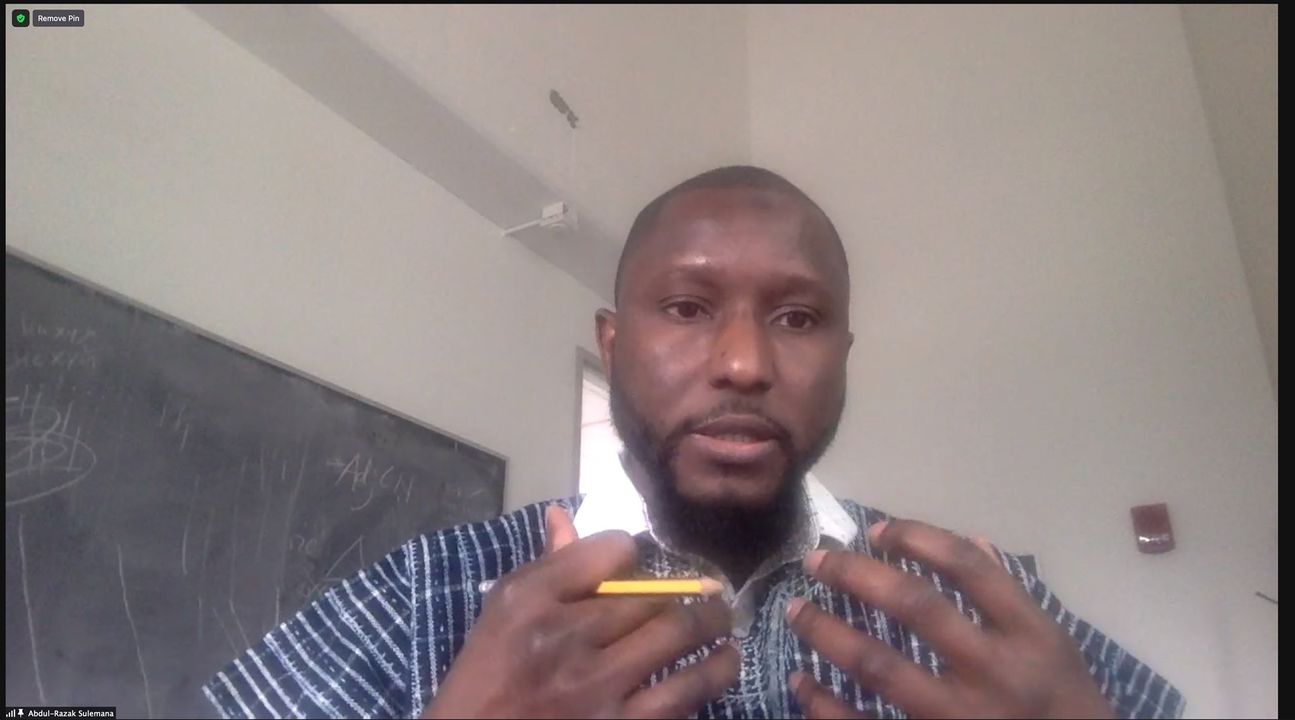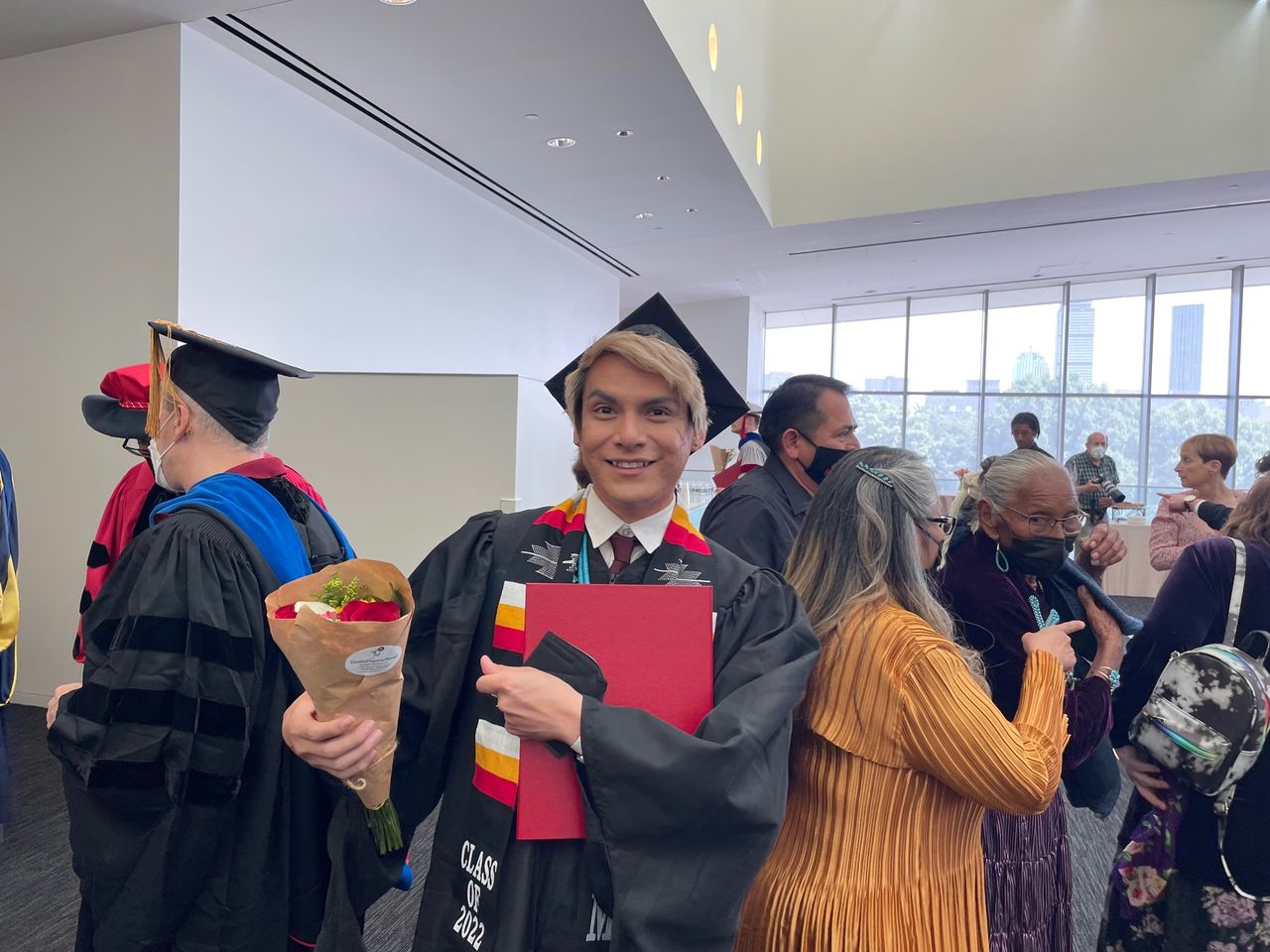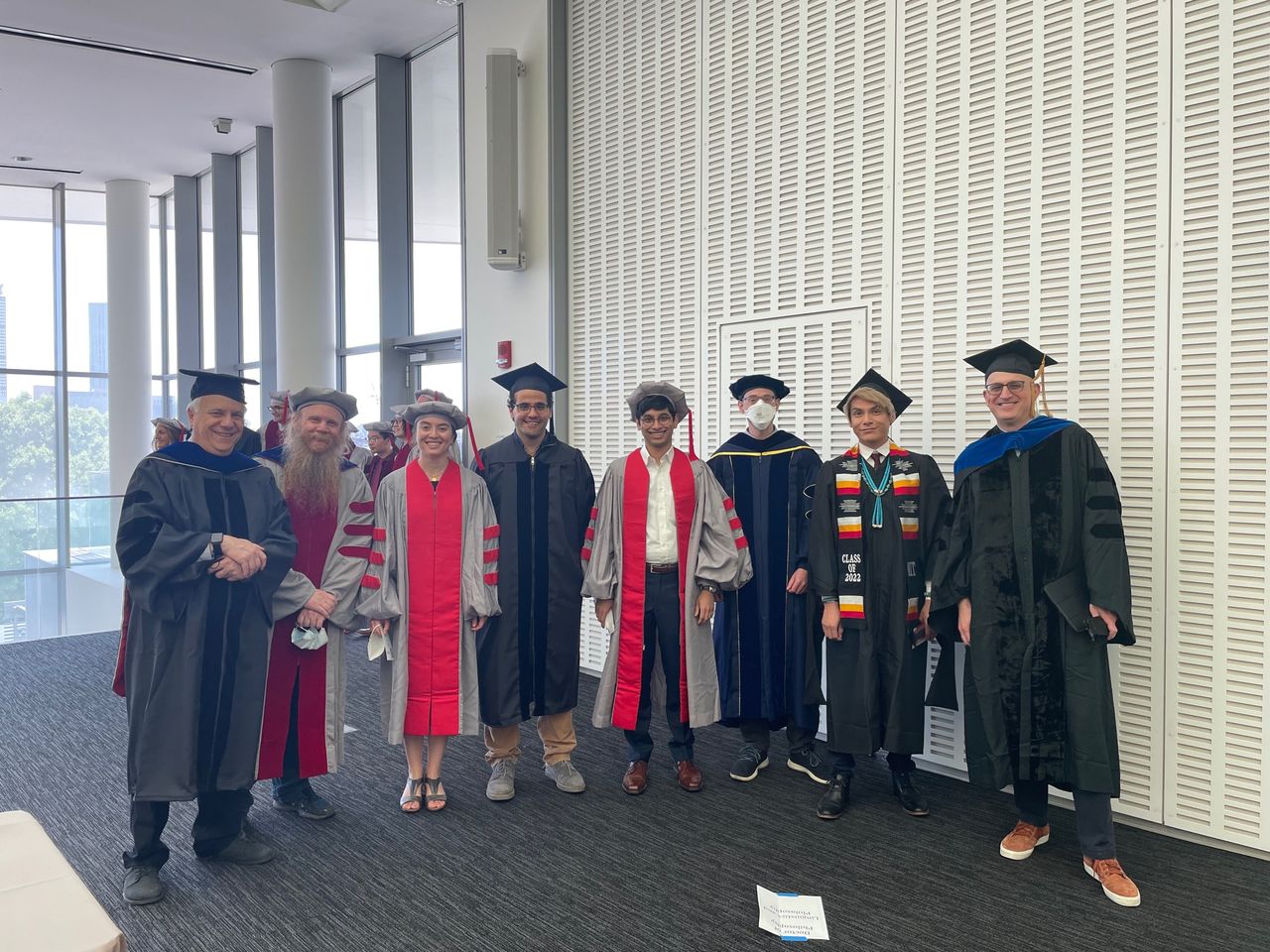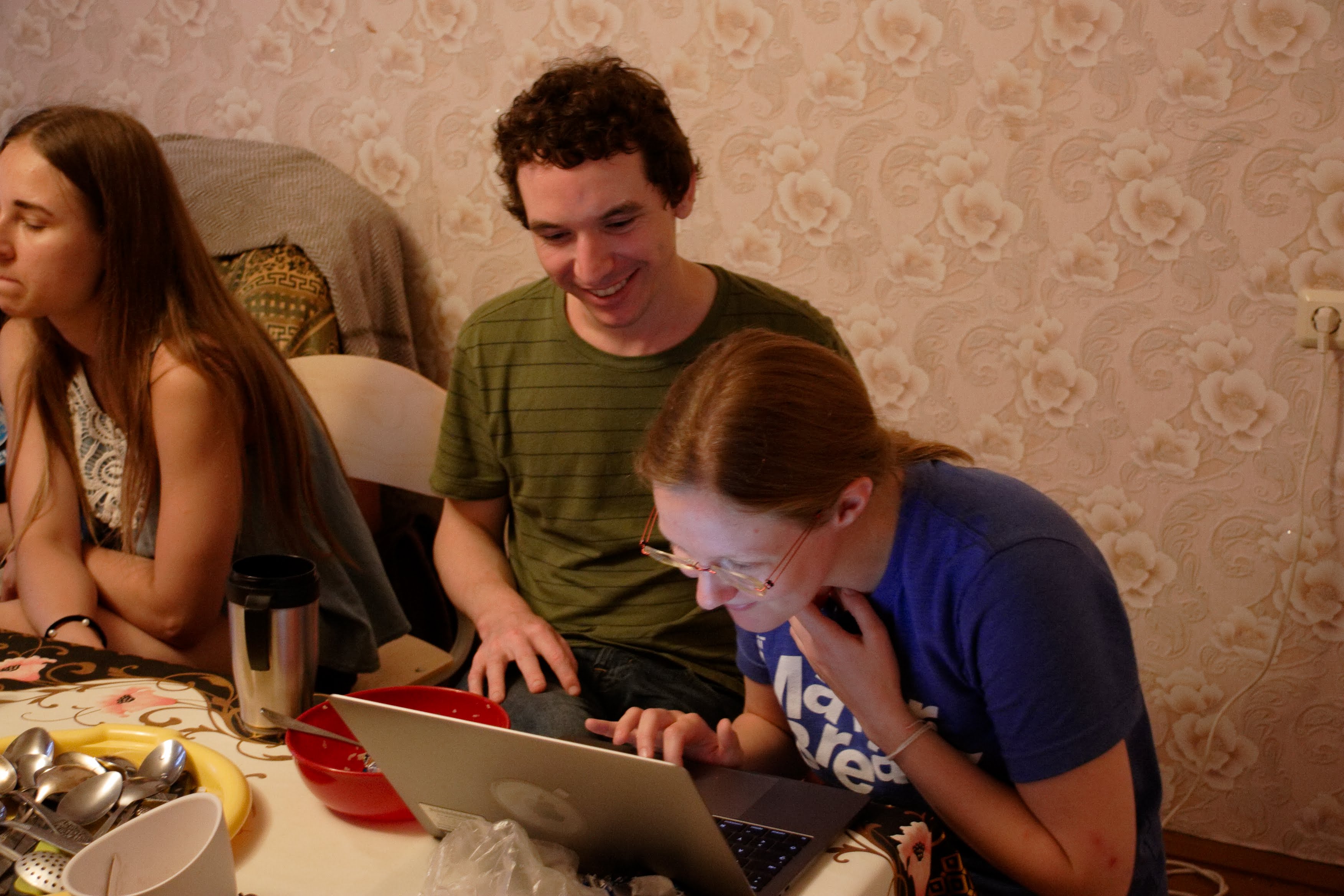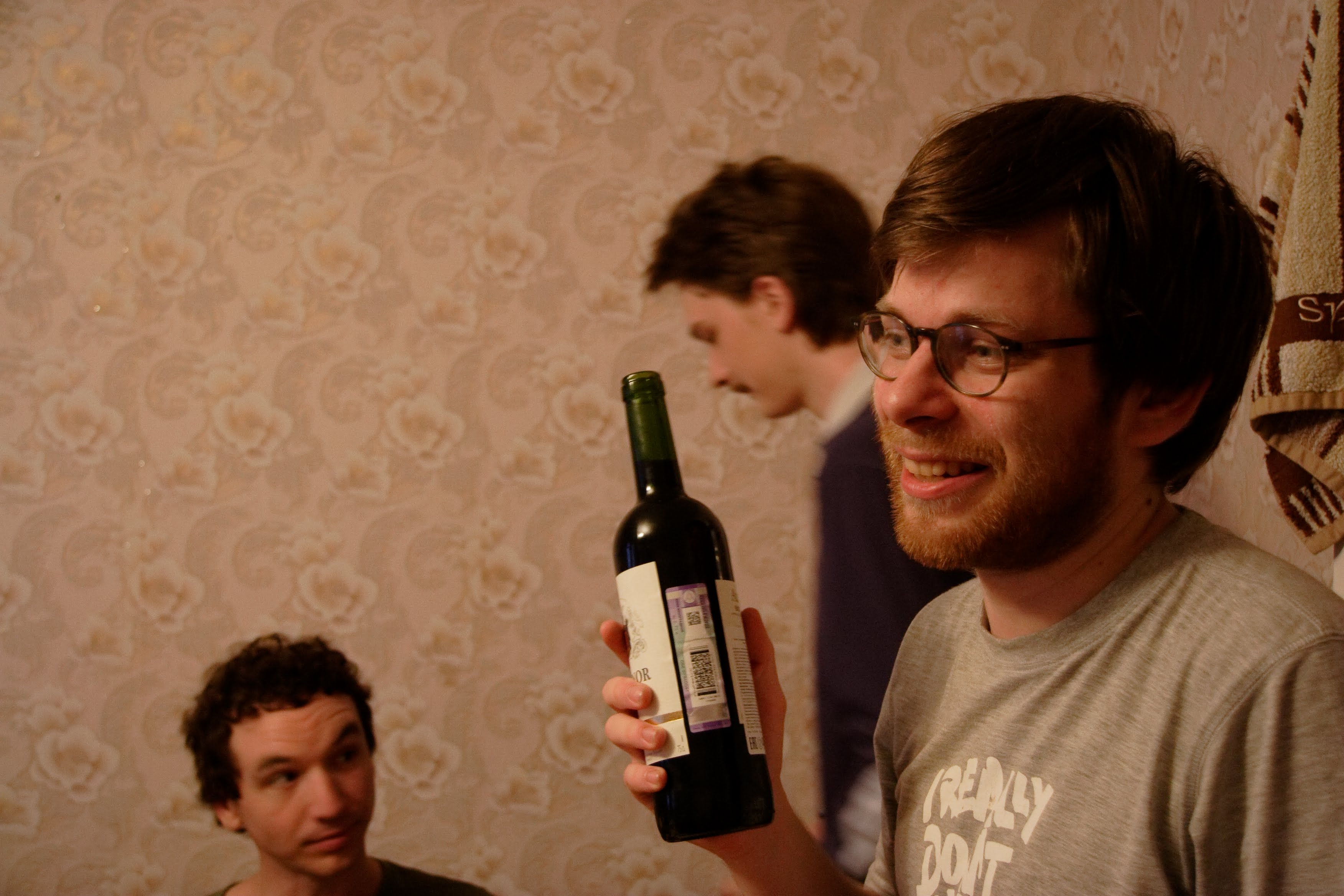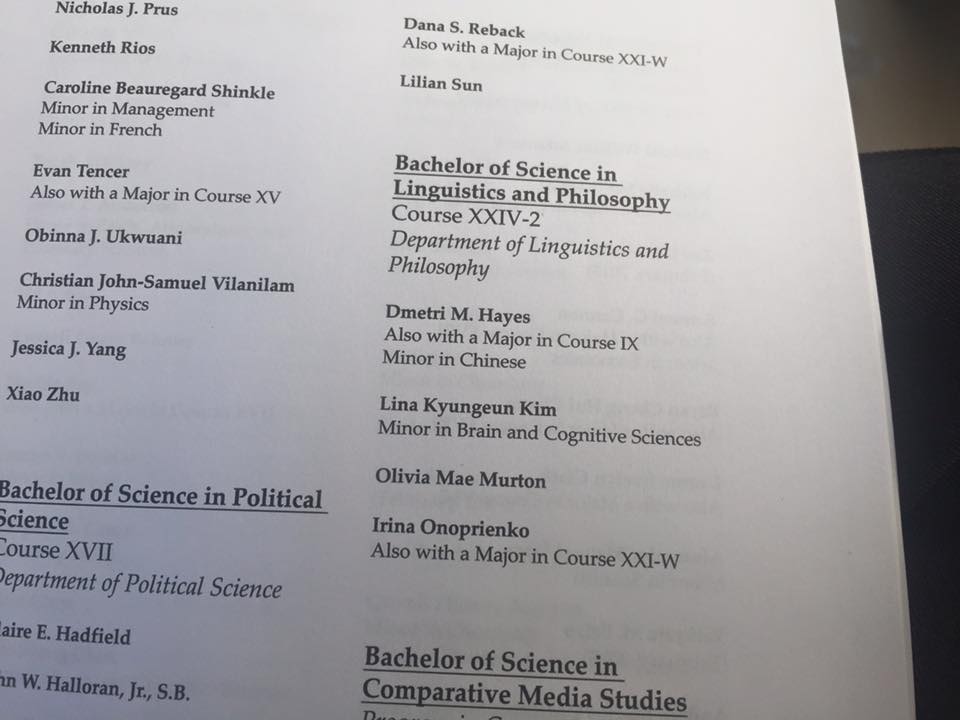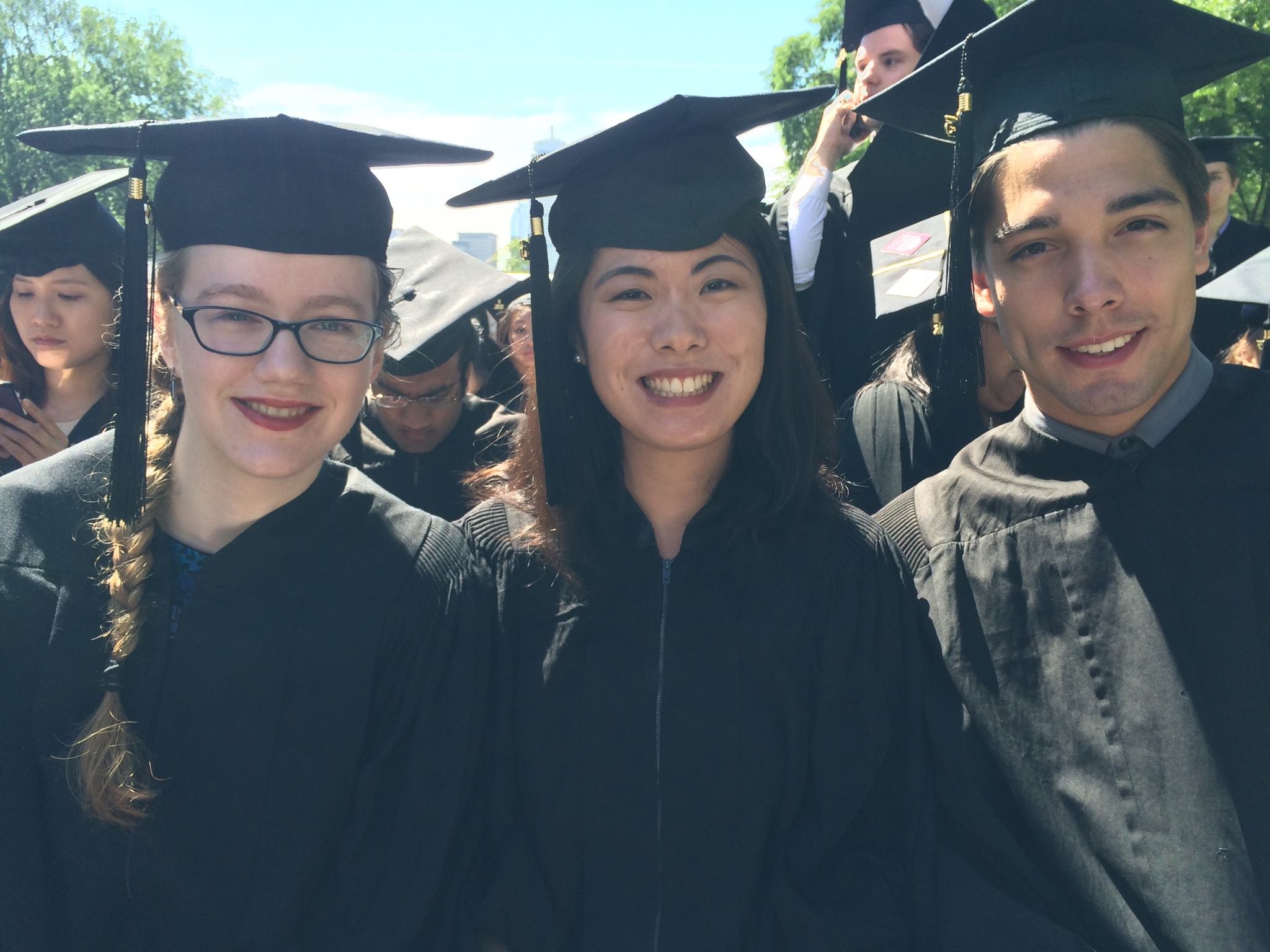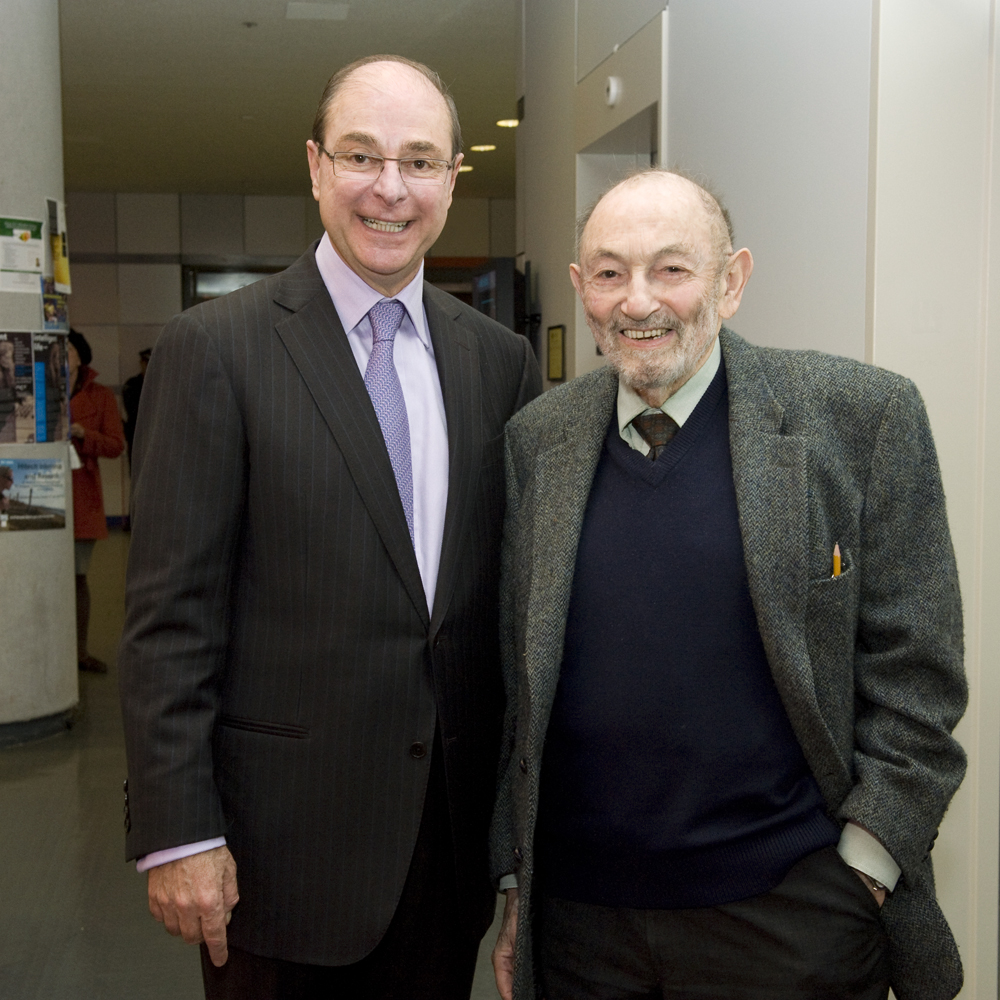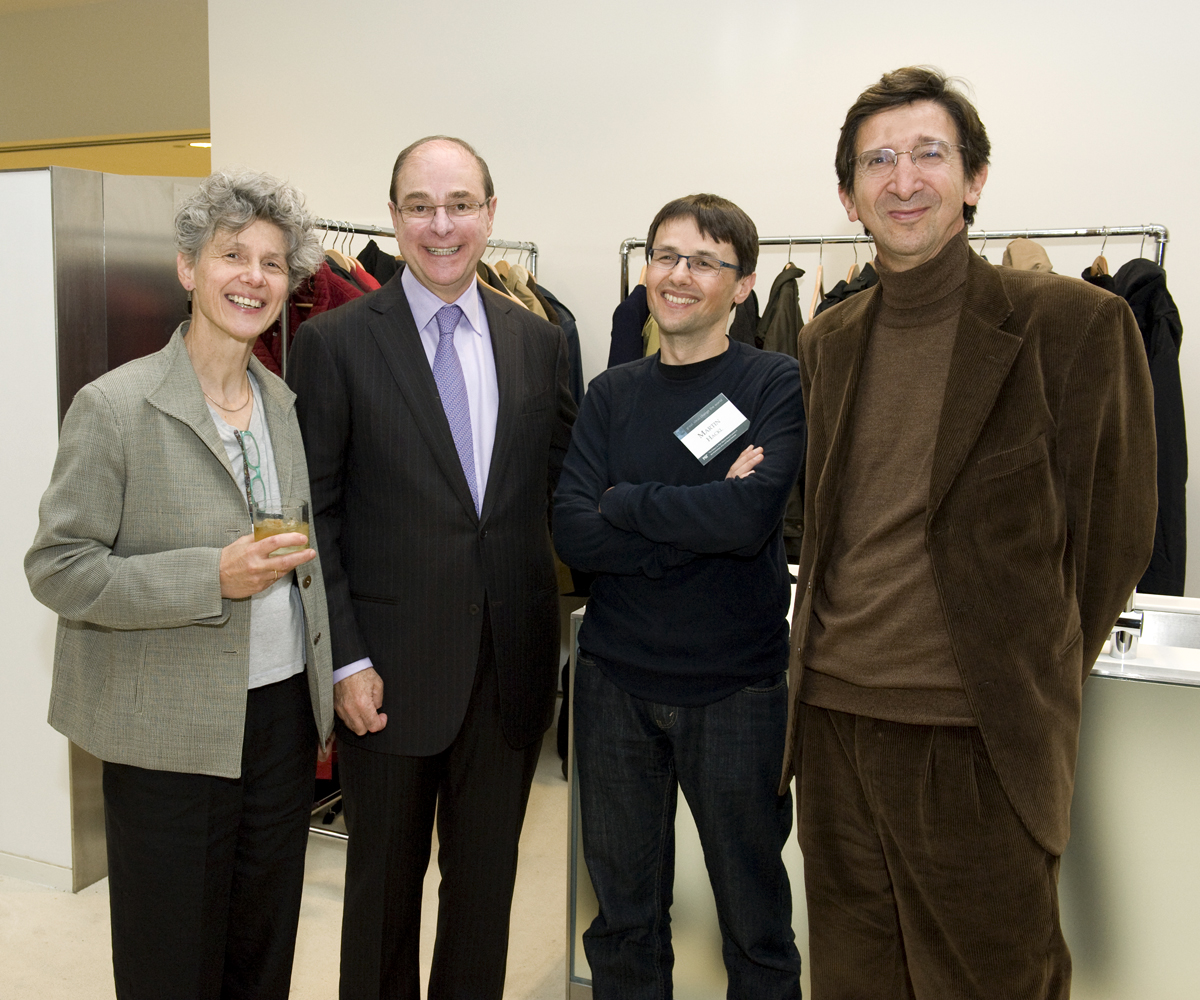Last week, Elise Newman presented and co-presented two talks at the Workshop on Locality at the University of Göttingen. Her solo talk was entitled “When wh-phrases are their own interveners, and she also presented a joint talk with Rob Truswell (based on even more joint work with Caroline Heycock), enitled “When to revisit? Investigating (un)ambiguity in temporal clauses”. Ksenia Ershova presented a talk based on joint work with Nikita Bezrukov, entitled “Moving away from antilocality: A defense of very local movement”. Several MIT alumni also presented at the workshop: Kenyon Branan, Mitya Privoznov, and Susi Wurmbrand.
Archive for the ‘Alumni News’ Category
Pesetsky @ NLP and Linguistics Workshop
Last Saturday (March 1), faculty David Pesetsky presented a talk titled “Is there an LLM challenge for linguistics? Or a linguistics challenge for LLMs?” at a one-day workshop Magdalen College, University of Oxford. The workshop entitled “Does ChatGPT know language as humans do?” was organized by our own recent alum Danfeng Wu.
Last Saturday (March 1), faculty David Pesetsky presented a talk titled “Is there an LLM challenge for linguistics? Or a linguistics challenge for LLMs?” at a one-day workshop Magdalen College, University of Oxford. The workshop entitled “Does ChatGPT know language as humans do?” was organized by our own recent alum Danfeng Wu.
Davis to Nord University!
Congratulations to alum Colin Davis (PhD 2020), who has accepted a permanent position as Associate Professor in English Language and Linguistics at Nord University in Norway! Colin has been working as “junior professor” (assistant professor) in the Department of linguistics at the University of Konstanz from 2021, and taught at the University of Southern California before that. Wonderful news, Colin — congratulations again!
Congratulations to alum Colin Davis (PhD 2020), who has accepted a permanent position as Associate Professor in English Language and Linguistics at Nord University in Norway! Colin has been working as “junior professor” (assistant professor) in the Department of linguistics at the University of Konstanz from 2021, and taught at the University of Southern California before that. Wonderful news, Colin — congratulations again!
Stanton tenured at NYU
News has reached us that our illustrious alum Juliet Stanton (PhD ‘17), a researcher in phonology and an Assistant Professor of Linguistics at NYU from 2017, has been awarded tenure (and promoted to Associate Professor) at that institution.
Congratulations, Juliet!!
Interview with Paul Elbourne
The well-known philosophy blog “3:16” just published a long and really interesting interview with Paul Elbourne of Oxford University — who the interviewer thinks is a philosopher but we really know to be a semantics graduate of MIT Linguistics (PhD 2002) (in other words, ours). Have a look: here.
The well-known philosophy blog “3:16” just published a long and really interesting interview with Paul Elbourne of Oxford University — who the interviewer thinks is a philosopher but we really know to be a semantics graduate of MIT Linguistics (PhD 2002) (in other words, ours). Have a look: here.
Roger Paul, SM ‘20: statement for Indigenous Peoples’ Day 2022
From the MIT front page, October 10, 2022 — Indigenous Peoples’ Day:
“The MIT Indigenous Languages Initiative provides tools to help graduates keep their communities’ threatened languages alive. For Indigenous Peoples’ Day, Roger Paul (SM ’20) penned this expression of gratitude in Passamaquoddy, around the MIT theme of “mind, hand, and heart.”
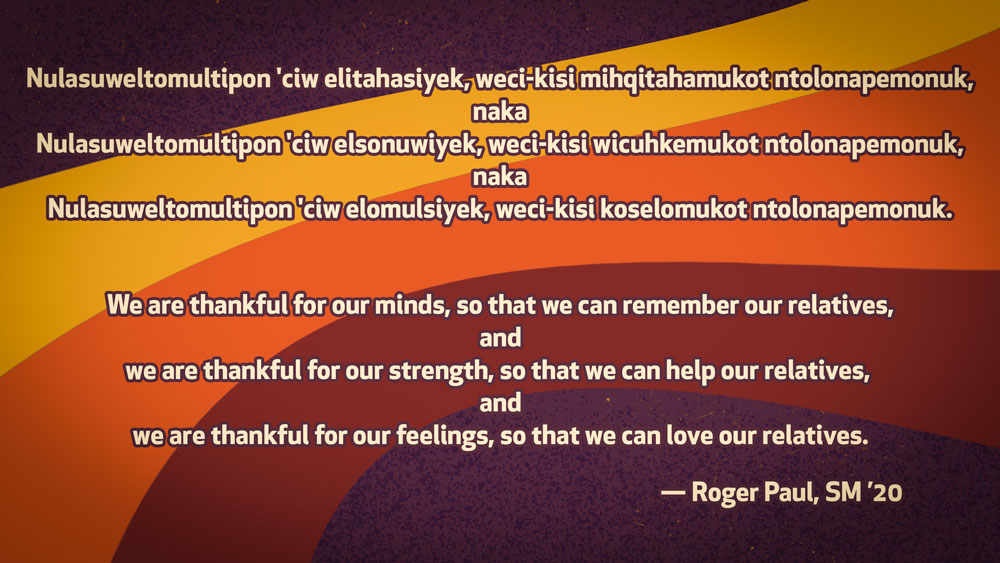
From the MIT front page, October 10, 2022 — Indigenous Peoples’ Day:
“The MIT Indigenous Languages Initiative provides tools to help graduates keep their communities’ threatened languages alive. For Indigenous Peoples’ Day, Roger Paul (SM ’20) penned this expression of gratitude in Passamaquoddy, around the MIT theme of “mind, hand, and heart.”

Sulemana to University of Ghana!
Great news from our recent alum Abdul-Razak Sulemana (PhD 2021), who has accepted a position as Lecturer ( = Assistant Professor) at the Department of Linguistics at the University of Ghana. Abdul-Razak will also be teaching syntax this summer at the African Linguistics School in Benin. Our warmest congratulations, Abdul-Razak!!
Abdul-Razak’s website: https://abdulrazaksulemana.com
Linguistics at the University of Ghana: https://www.ug.edu.gh/linguistics/
Linguistics at the University of Ghana: https://www.ug.edu.gh/linguistics/
Graduate Commencement 2022!
Congratulations to Devon Denny, who brilliantly completed our Masters program in Linguistics under the MIT Indigenous Languages Initiative!
Three of our recent PhDs also received their diplomas and ceremonial hoods from Department Head Danny Fox at MIT’s graduate commencement ceremony this afternoon: renewed congratulations to Neil Banerjee, Itai Bassi, and Elise Newman on their wonderful achievements!!
Kotek takes over as senior Chair of the LSA Committee on Gender Equity in Linguistics (COGEL)
Starting in January 2022, our alum Hadas Kotek (PhD 2014), a Research Affiliate in our department, will become the Senior Chair of the LSA Committee on Gender Equity in Linguistics. COGEL’s official charge is “to monitor and advance the status of women in Linguistics and advocate on behalf of gender diversity and equality issues.” COGEL is a self-nominating committee and is always happy to welcome new participants of all genders and career stages. COGEL’s annual meeting will take place virtually on January 14, 2022, at 12pm EST, and will showcase the committee’s accomplishments over the past year as well as plans for the coming one. Anyone who is interested in attending the meeting or joining the committee should write Hadas Kotek at <hkotek@mit.edu>.
Starting in January 2022, our alum Hadas Kotek (PhD 2014), a Research Affiliate in our department, will become the Senior Chair of the LSA Committee on Gender Equity in Linguistics. COGEL’s official charge is “to monitor and advance the status of women in Linguistics and advocate on behalf of gender diversity and equality issues.” COGEL is a self-nominating committee and is always happy to welcome new participants of all genders and career stages. COGEL’s annual meeting will take place virtually on January 14, 2022, at 12pm EST, and will showcase the committee’s accomplishments over the past year as well as plans for the coming one. Anyone who is interested in attending the meeting or joining the committee should write Hadas Kotek at <hkotek@mit.edu>.
Kotek publishes two papers in Language:
Two new papers by Hadas Kotek (PhD 2014, current research affiliate) on gender bias and stereotypes in example sentences in syntax textbooks and in journal papers have appeared in the most recent volume of Language. Both papers are featured in a news release by the LSA and will be the subject of a Meet the Authors webinar Friday, January 28, at 12pm EST (please click on the link to sign up for the webinar).
The full text of the news release is copied here:
Persistent gender bias found in scientific research and related course materials: A long-term linguistic analysis
Two companion research articles published in the current issue of Language point to persistent gender bias in both peer-reviewed journal articles and course materials used in the field of linguistics. The first study examined undergraduate textbooks commonly used for linguistics courses taught in English. The second study examined over 1,000 research articles published in top linguistics journals over the past 20 years. Further details about the findings of each article are presented separately below.
Gender Bias in Linguistics Textbooks
Biases are not always expressed explicitly. Quite often, biases are revealed implicitly in the way that speakers use language—even when these speakers are highly aware of the power of language and the potential dangers of such biases. A recent study appearing in the December issue of Language by Paola Cépeda (Stony Brook University), Hadas Kotek (Massachusetts Institute of Technology), Katharina Pabst (University of Toronto), and Kristen Syrett (Rutgers, The State University of New Jersey – New Brunswick), demonstrates precisely this pattern in the field of linguistics. The full article may be read here: https://www.linguisticsociety.org/sites/default/files/03_97.4Cepeda.pdf.
Linguists study the structure and interpretation of example sentences in order to investigate rules of grammar. In this article, the authors systematically studied example sentences from textbooks designed to teach undergraduate students about the structure of language (syntax), asking whether the selection and placement of words in these sentences communicate a gender bias to students of linguistics. The idea itself is not new: over 20 years ago, Macaulay and Brice conducted a similar study in a (1997) article published in the same venue. The current authors asked whether anything has changed since 1997. The answer, the authors say, is unfortunately, no. This pattern has continued to be prevalent in the field of linguistics for decades now, implicitly communicating a deeply ingrained bias against women to undergraduate students who are learning about the study of language as a science.
Specifically, the analysis shows that male-gendered protagonists occur almost twice as often as female-gendered ones and appear in more prominent roles. The trend does not stop there: men are more likely to be portrayed as having stable occupations, handling books, and spreading violence, whereas women are more likely to exhibit emotions (especially negative ones). Based on these results, the authors argue that there is a pressing need to revisit pedagogical materials in order to prevent the perpetuation of implicit gender biases in higher education instruction.
Gender Bias in Linguistics Journals
A new study appearing in the December issue of Language by Hadas Kotek (Massachusetts Institute of Technology), Rikker Dockum (Swarthmore College), Sarah Babinski (Yale University), and Christopher Geissler (Heinrich Heine University Düsseldorf) has uncovered persistent and wide-reaching gender bias in scientific articles about language appearing in leading linguistic journals. The full article may be read here: https://www.linguisticsociety.org/sites/default/files/02_97.4Kotek.pdf.
In this study, the authors analyzed more than 15,000 example sentences published in three top linguistics journals, including Language, over the past twenty years. Their findings include that: 1) stereotypes about both men and women are prevalent in the data; 2) non-binary gender identities are all but absent, and 3) male protagonists are chosen to appear in example sentences at more than twice the rate of non-male protagonists. They also found that these patterns are consistent throughout the past twenty years and hold regardless of the gender of the authors and the language being studied, suggesting that this bias is entrenched across the entire field of language science.
The authors offer concrete proposals for language researchers to counteract systemic biases. Among other measures, they recommend increased attention to word choices, to stereotypes being used, and to any unnecessary use of gendered language. They also suggest the use of non-gendered terms and singular ‘they’. The authors further provide advice for teachers, field workers, journal editors, and other members of the scientific community on how to avoid the pitfalls of implicit bias.
Gender Bias in Linguistics Textbooks
Biases are not always expressed explicitly. Quite often, biases are revealed implicitly in the way that speakers use language—even when these speakers are highly aware of the power of language and the potential dangers of such biases. A recent study appearing in the December issue of Language by Paola Cépeda (Stony Brook University), Hadas Kotek (Massachusetts Institute of Technology), Katharina Pabst (University of Toronto), and Kristen Syrett (Rutgers, The State University of New Jersey – New Brunswick), demonstrates precisely this pattern in the field of linguistics. The full article may be read here: https://www.linguisticsociety.org/sites/default/files/03_97.4Cepeda.pdf.
Linguists study the structure and interpretation of example sentences in order to investigate rules of grammar. In this article, the authors systematically studied example sentences from textbooks designed to teach undergraduate students about the structure of language (syntax), asking whether the selection and placement of words in these sentences communicate a gender bias to students of linguistics. The idea itself is not new: over 20 years ago, Macaulay and Brice conducted a similar study in a (1997) article published in the same venue. The current authors asked whether anything has changed since 1997. The answer, the authors say, is unfortunately, no. This pattern has continued to be prevalent in the field of linguistics for decades now, implicitly communicating a deeply ingrained bias against women to undergraduate students who are learning about the study of language as a science.
Specifically, the analysis shows that male-gendered protagonists occur almost twice as often as female-gendered ones and appear in more prominent roles. The trend does not stop there: men are more likely to be portrayed as having stable occupations, handling books, and spreading violence, whereas women are more likely to exhibit emotions (especially negative ones). Based on these results, the authors argue that there is a pressing need to revisit pedagogical materials in order to prevent the perpetuation of implicit gender biases in higher education instruction.
Gender Bias in Linguistics Journals
A new study appearing in the December issue of Language by Hadas Kotek (Massachusetts Institute of Technology), Rikker Dockum (Swarthmore College), Sarah Babinski (Yale University), and Christopher Geissler (Heinrich Heine University Düsseldorf) has uncovered persistent and wide-reaching gender bias in scientific articles about language appearing in leading linguistic journals. The full article may be read here: https://www.linguisticsociety.org/sites/default/files/02_97.4Kotek.pdf.
In this study, the authors analyzed more than 15,000 example sentences published in three top linguistics journals, including Language, over the past twenty years. Their findings include that: 1) stereotypes about both men and women are prevalent in the data; 2) non-binary gender identities are all but absent, and 3) male protagonists are chosen to appear in example sentences at more than twice the rate of non-male protagonists. They also found that these patterns are consistent throughout the past twenty years and hold regardless of the gender of the authors and the language being studied, suggesting that this bias is entrenched across the entire field of language science.
The authors offer concrete proposals for language researchers to counteract systemic biases. Among other measures, they recommend increased attention to word choices, to stereotypes being used, and to any unnecessary use of gendered language. They also suggest the use of non-gendered terms and singular ‘they’. The authors further provide advice for teachers, field workers, journal editors, and other members of the scientific community on how to avoid the pitfalls of implicit bias.
First LSA Morris Halle Award to alum Juliet Stanton (2017 PhD)
We were utterly delighted to learn that our brilliant 2017 PhD alum Juliet Stanton, now an Assistant Professor at New York University, has won the very first Morris Halle Memorial Award for Faculty Excellence in Phonology, awarded by the Linguistic Society of America.
Morris Halle, of course, was the co-founder (with Noam Chomsky) of MIT Linguistics, one of the most important progenitors of modern phonology, and our beloved colleague and friend, sorely missed. We could not be more thrilled that one of our own, thus an institutional as well as intellectual descendant of Morris, was chosen as the first recipient of this award in his memory. To quote the citation from the LSA:
“First established in 2021, the Morris Halle Award for Faculty Excellence in Phonology will be used to defray expenses associated with participation in the LSA’s Annual Meeting. It is to be awarded for outstanding scholarship in phonology by an early career faculty member in linguistics. With this award, the LSA recognizes in Stanton’s research the linguistic spirit of Morris Halle: her work is fundamental and far-reaching, rigorous and comprehensive, deep and broad. She leads the field in redefining what it means to do Phonology. By combining analysis with experiments and computational modeling in the service of theory, she has reinvigorated the field of phonological typology. By exhausting the available data, she sets a new bar for empirical depth. All those that worked with Morris will be hearing in their heads his voice proclaiming, ‘You gotta read this paper by Juliet!’ Congratulations on this well-deserved honor.”
Congratulations indeed!
“First established in 2021, the Morris Halle Award for Faculty Excellence in Phonology will be used to defray expenses associated with participation in the LSA’s Annual Meeting. It is to be awarded for outstanding scholarship in phonology by an early career faculty member in linguistics. With this award, the LSA recognizes in Stanton’s research the linguistic spirit of Morris Halle: her work is fundamental and far-reaching, rigorous and comprehensive, deep and broad. She leads the field in redefining what it means to do Phonology. By combining analysis with experiments and computational modeling in the service of theory, she has reinvigorated the field of phonological typology. By exhausting the available data, she sets a new bar for empirical depth. All those that worked with Morris will be hearing in their heads his voice proclaiming, ‘You gotta read this paper by Juliet!’ Congratulations on this well-deserved honor.”
Newman to Edinburgh (and Branan to Berlin)!
We are thrilled to learn that fifth-year student Elise Newman has accepted a two-year postdoctoral position in Syntax at the University of Edinburgh, starting next Fall. She will be collaborating with Robert Truswell (Edinburgh), as well as with Thomas McFadden (Berlin), Sandhya Sundaresan (Göttingen/Stony Brook) and Hedde Zeijlstra (Göttingen) on a multi-national project entitled “Locality and the Argument-Adjunct Distinction: Structure-building vs. Structure-enrichment” (jointly funded by the Arts and Humanities Research Council and the Deutsche Forschungsgemeinschaft). The project investigates several new hypotheses concerning the typology of locality restrictions observed in various syntactic dependencies.
We were just as delighted to learn that Elise will also be collaborating on this project with our alum Kenyon Branan (PhD 2018) — who has accepted a parallel postdoc in the project, based at ZAS (Leibniz-Centre General Linguistics) in Berlin.
Congratulations both! We expect great discoveries from this project!!
Davis to Konstanz!
We have just received the exciting news that our distinguished and very recent alum Colin Davis (PhD 2020) has accepted a position as Junior Professor (≅Assistant Professor) of English Linguistics at the University of Konstanz. Colin completed his PhD last summer with a dissertation on The Linear Limitations of Syntactic Derivations, and is currently a Postdoctoral Scholar and Teaching Fellow at the University of Southern California. He will begin his new position in October.
Congratulations and herzliche Glückwünsche, Colin!!
We have just received the exciting news that our distinguished and very recent alum Colin Davis (PhD 2020) has accepted a position as Junior Professor (≅Assistant Professor) of English Linguistics at the University of Konstanz. Colin completed his PhD last summer with a dissertation on The Linear Limitations of Syntactic Derivations, and is currently a Postdoctoral Scholar and Teaching Fellow at the University of Southern California. He will begin his new position in October.
Congratulations and herzliche Glückwünsche, Colin!!
Aravind & Rasin paper in Natural Language Semantics
A new paper by alum Ezer Rasin (PhD 2018) and faculty colleague Athulya Aravind (also PhD 2018) has just been published in the journal Natural Language Semantics, entitled “The nature of the semantic stimulus: the acquisition of every as a case study”. (It’s open access, so please click on the link to read!) Here’s the abstract:
We evaluate the richness of the child’s input in semantics and its relation to the hypothesis space available to the child. Our case study is the acquisition of the universal quantifier every. We report two main findings regarding the acquisition of every on the basis of a corpus study of child-directed and child-ambient speech. Our first finding is that the input in semantics (as opposed to the input in syntax or phonology) is rich enough to systematically eliminate instances of the subset problem of language acquisition: overly general hypotheses about the meaning of every can violate pragmatic constraints, making such hypotheses incompatible with the child’s input. Our second finding is that the semantic input is too poor to eliminate instances of what we refer to as the superset problem, the mirror image of the subset problem. We argue that at least some overly specific hypotheses about the meaning of every are compatible with the child’s input, suggesting either that those hypotheses are not made available by UG or that non-trivial inductive biases are involved in children’s acquisition of every.
A new paper by alum Ezer Rasin (PhD 2018) and faculty colleague Athulya Aravind (also PhD 2018) has just been published in the journal Natural Language Semantics, entitled “The nature of the semantic stimulus: the acquisition of every as a case study”. (It’s open access, so please click on the link to read!) Here’s the abstract:
We evaluate the richness of the child’s input in semantics and its relation to the hypothesis space available to the child. Our case study is the acquisition of the universal quantifier every. We report two main findings regarding the acquisition of every on the basis of a corpus study of child-directed and child-ambient speech. Our first finding is that the input in semantics (as opposed to the input in syntax or phonology) is rich enough to systematically eliminate instances of the subset problem of language acquisition: overly general hypotheses about the meaning of every can violate pragmatic constraints, making such hypotheses incompatible with the child’s input. Our second finding is that the semantic input is too poor to eliminate instances of what we refer to as the superset problem, the mirror image of the subset problem. We argue that at least some overly specific hypotheses about the meaning of every are compatible with the child’s input, suggesting either that those hypotheses are not made available by UG or that non-trivial inductive biases are involved in children’s acquisition of every.
Colin Philips elected AAAS Fellow
Congratulations to our brilliant and accomplished alum Colin Philips (PhD 1996) on his election (announced last week) as Fellow of the American Association for the Advancement of Science — for “outstanding contributions to psycholinguistics, advocacy for Linguistics and Language Science, superior mentorship and teaching, and a vision of what linguistic education should be”. Colin is a Professor of Linguistics at the University of Maryland, where he also heads the Language Science Center. Congratulations on this well-deserved honor!!
There are (now) 55 AAAS fellows in the Linguistics and Language Science section of that organization — of whom 18, about 1/3 of the total number, are MIT alums or faculty!
Book by Sam Al Khatib published!
In the midst of everything, positive linguistics news continues to exist. We have learned that our recent alum Sam Al Khatib (PhD 2013) has published a book entitled Focus, Evaluativity, and Antonymy: A Study in the Semantics of Only and its Interaction with Gradable Antonyms — in the series Studies in Linguistics and Philosophy from Springer. Sam is an Assistant Professor of Linguistics at the CUNY Graduate Center. Congratulations, Sam!!
In the midst of everything, positive linguistics news continues to exist. We have learned that our recent alum Sam Al Khatib (PhD 2013) has published a book entitled Focus, Evaluativity, and Antonymy: A Study in the Semantics of Only and its Interaction with Gradable Antonyms — in the series Studies in Linguistics and Philosophy from Springer. Sam is an Assistant Professor of Linguistics at the CUNY Graduate Center. Congratulations, Sam!!
Franklin medal for Barbara Partee
Congratulations to one of our most most distinguished alums, Barbara Hall Partee (PhD 1965), Professor emerita at UMass Amherst — a winner of the 2020 Franklin medal awarded by the Franklin Institute. In the citation accompanying the award, Barbara is hailed for “her foundational contributions that synthesize insights from linguistics, philosophy, logic, and psychology to understand how words and sentences combine to express meaning in humanlanguage”. The list of previous award winners includes Nikola Tesla, Thomas Edison, Rudolf Diesel, Pierre and Marie Curie, Orville Wright, Albert Einstein, Edwin Hubble, Frank Lloyd Wright and more people you have heard of than we can list here!
Barbara was a member of the very first PhD class at MIT Linguistics and is rightly considered a founder of the field of formal semantics within linguistics.
award: https://www.fi.edu/laureates/barbara-partee
homepage: https://people.umass.edu/partee/
dissertation: http://dspace.mit.edu/handle/1721.1/13005
Congratulations to one of our most most distinguished alums, Barbara Hall Partee (PhD 1965), Professor emerita at UMass Amherst — a winner of the 2020 Franklin medal awarded by the Franklin Institute. In the citation accompanying the award, Barbara is hailed for “her foundational contributions that synthesize insights from linguistics, philosophy, logic, and psychology to understand how words and sentences combine to express meaning in humanlanguage”. The list of previous award winners includes Nikola Tesla, Thomas Edison, Rudolf Diesel, Pierre and Marie Curie, Orville Wright, Albert Einstein, Edwin Hubble, Frank Lloyd Wright and more people you have heard of than we can list here!
Barbara was a member of the very first PhD class at MIT Linguistics and is rightly considered a founder of the field of formal semantics within linguistics.
award: https://www.fi.edu/laureates/barbara-partee
homepage: https://people.umass.edu/partee/
dissertation: http://dspace.mit.edu/handle/1721.1/13005
Levin to Facebook
Congratulations to our alum Ted Levin (PhD 2015) on his new job at Facebook in Seattle! Here’s what he writes to us about his new position:
“I’ve been working as a Linguist at Facebook Reality Labs for the past month or so. I’ve found the work to be challenging with lots of new things to learn, and am enjoying it despite it being quite different than my academic work. Broadly speaking, the team of ~20 linguists that I’m a part of sits at the very beginning of a pipeline to make Facebook apps better at understanding user intentions through voice or text.
“Narrowly, my job is to identify ways in which users might want to interact with Facebook apps (e.g. send messages, get recommendations, set reminders), collect data to exemplify the utterances that satisfy requests within these domains, and oversee the annotation of this data so that it can be utilized to train machine learning algorithms farther down the pipeline.”
Before joining Facebook, Ted was a post-doc at the University of Maryland and at the National University of Singapore. It is very exciting to learn of the many new possibilities available for linguists (and the increasing importance of linguistics expertise) in today’s world! Wonderful news, Ted!!
Congratulations to our alum Ted Levin (PhD 2015) on his new job at Facebook in Seattle! Here’s what he writes to us about his new position:
“I’ve been working as a Linguist at Facebook Reality Labs for the past month or so. I’ve found the work to be challenging with lots of new things to learn, and am enjoying it despite it being quite different than my academic work. Broadly speaking, the team of ~20 linguists that I’m a part of sits at the very beginning of a pipeline to make Facebook apps better at understanding user intentions through voice or text.
“Narrowly, my job is to identify ways in which users might want to interact with Facebook apps (e.g. send messages, get recommendations, set reminders), collect data to exemplify the utterances that satisfy requests within these domains, and oversee the annotation of this data so that it can be utilized to train machine learning algorithms farther down the pipeline.”
Before joining Facebook, Ted was a post-doc at the University of Maryland and at the National University of Singapore. It is very exciting to learn of the many new possibilities available for linguists (and the increasing importance of linguistics expertise) in today’s world! Wonderful news, Ted!!
Uegaki to Edinburgh
News has reached us from our recent alum Wataru Uegaki (PhD 2015) that he has accepted a position as a Lecturer in Semantics (≅ Assistant Professor) in the Linguistics department of the University of Edinburgh. Wataru is currently an Assistant Professor at the University of Leiden, in the Netherlands. Congratulations, Wataru!!
News has reached us from our recent alum Wataru Uegaki (PhD 2015) that he has accepted a position as a Lecturer in Semantics (≅ Assistant Professor) in the Linguistics department of the University of Edinburgh. Wataru is currently an Assistant Professor at the University of Leiden, in the Netherlands. Congratulations, Wataru!!
Summer News
We have some summer news to share with you:
- The CreteLing Summer School took place in July at the University of Crete in Rethymnon, and several MIT faculty (and alumni) taught courses:
- Adam Albright - Advanced Morphology: Syncretism and Paradigm Structure
- Kai von Fintel and Sabine Iatridou - The Linguistics of Desire
- Sabine Iatridou - Introduction to Syntax
- Shigeru Miyagawa - Language and Animal Communication in Evolution
- Donca Steriade - Introduction to Phonology
The summer school was attended by many MIT students as well: Rafael Abramovitz (4th year), Daniel Asherov (2nd year), Tanya Bondarenko (2nd year), Colin Davis (4th year), Ömer Demirok (5th year), Verena Hehl (4th year), Maša Močnik (4th year), Elise Newman (3rd year), Frank Staniszewski (3rd year) and Stan Zompi (2nd year). Rafael, Daniel, Tanya and Ömer also served as course TAs. Check out nice photos from the event, such as this one below, on the summer school’s Facebook page.
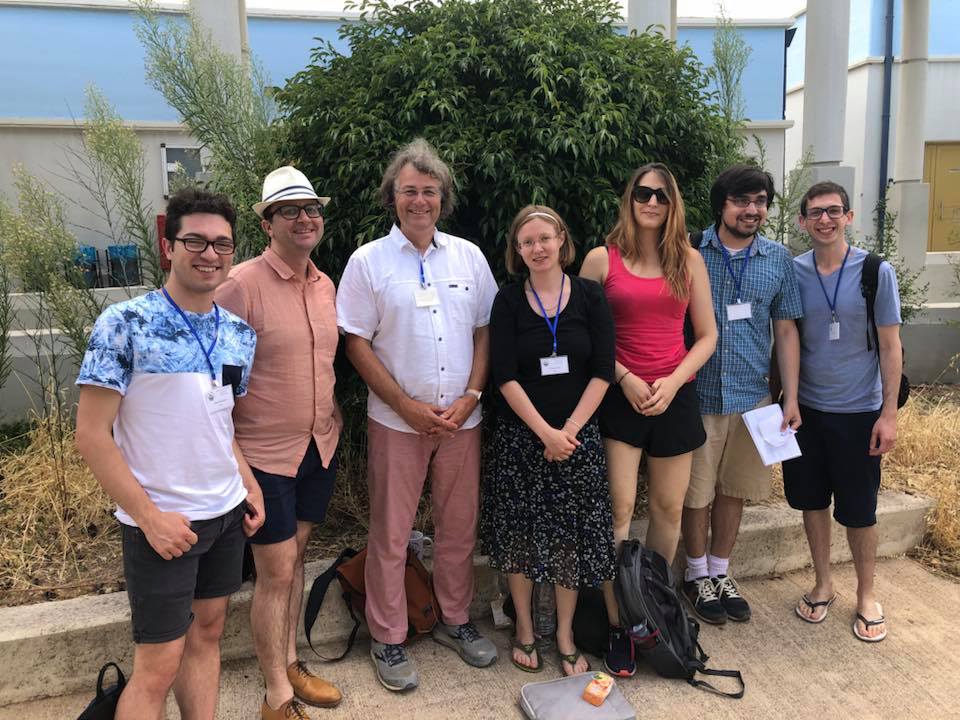
- Justin Colley (4th year), Verena Hehl, Anton Kukhto (1st year) and Mitya Privoznov (4th year) went into the heart of Siberia for a fieldwork expedition in the village of Kazym, Central Khanty. Mitya reports: “We had a lot of fun, suffered from mosquitoes and hopefully gathered some useful data as well :).”
- In August, Tanya Bondarenko and Colin Davis participated in a joint fieldtrip with a group of researchers from Lomonosov Moscow State University to study Barguzin Buryat in Baraghan village, the Republic of Buryatia, Russia.
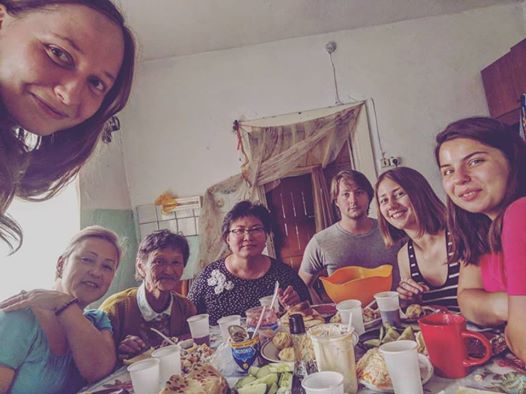
- Conference presentations:
- Neil Banerjee (3rd year) presented at the Canadian Linguistic Association (May 30-June 1) on CARP in Kinyarwanda, and at CHRONOS 13 (June 4-June 6) on the temporal orientation of necessity modals.
- In early June, Elise Newman (3rd year) went to the University of Olomouc, Czech Republic and presented work on the English auxiliary system at OLINCO. Elise: “Several MIT alumni were there; Joe Emonds co-organized the conference and I found out that he and I are both Cubs fans!”.
- Filipe Kobayashi (2nd year) and Sherry Chen (2nd year) presented joint work on distributive numerals in Mandarin Chinese at the student session of the North American Summer School on Logic, Language, and Information (NASSLLI), held at CMU in late June. Maša Močnik also attended the summer school.
- On August 4, Danfeng Wu (3rd year), Shigeru Miyagawa (faculty), Masatoshi Koizumi (PhD ’95, now at Tohoku University) and Mamoru Saito (PhD ’85, now at Nanzan University) gave talks at the Workshop on Case Theory and Labeling of Structures at the University of Tokyo. Prior to that on July 28, Danfeng presented a poster co-authored with Shigeru and Masatoshi at MAPLL × TCP × TL × TaLK (MT3) at Keio University. After that, she also attended and presented at the Summer Seminar on Frontiers of Language and Cognition Research.
- Norvin Richards (faculty) gave a series of talks on Contiguity Theory at SICOGG 20 in Seoul, held on August 8-10, and then another talk at Kyungpook National University in Daegu.
- Just a few days ago, Verena Hehl gave a presentation at SLE in Tallinn on Bildungsplan Baden Württeberg 2016: Promoting Grammar as Science from the bottom up – a case study.
- Education:
- Neil Banerjee, Cora Lesure (3rd year) and Dóra Takács (2nd year) taught a 7-week introductory linguistics course for middle and high school students as part of HSSP, from June till August. Their course, entitled `How language works’, covered topics ranged from sound production and the IPA over cross-linguistic variation and case to NPIs and implicatures. Dóra writes: “About 35 students participated in the class, which was hopefully a lot of fun and definitely an interesting and valuable experience for everyone.”
- Naomi Francis (5th year), Verena Hehl and Maša Močnik graduated from the Kaufman Teaching Certificate Program (KTCP) in June. The participants report: “Graduates of the KTCP attend 8 sessions on a wide range of topics in teaching and learning and are exposed to current research on pedagogical methodology through assigned readings and in-class discussions. We also had the opportunity to create and receive feedback on teaching philosophy statements for academic job applications.”
-
In May, Abdul Latif Jameel World Education Lab (J-WEL), an MIT initiative to support global education, announced a grant funding to MITILI student Newell Lewey and to prof. Norvin Richards for the project Skicinuwi-npisun: A Community-Centered Project for Documentation and Teaching of the Passamaquoddy Language. The project supports language teaching and curriculum development to help preserve the severely endangered Passamaquoddy language of Northern Maine. The grant includes funding for Newell’s language classes, and for a group of graduate students from the department to travel with Norvin to Passamaquoddy country to work with elders. Here you can read a little more about the project. Congratulations Newell and Norvin!
- Alumni news:
- Our distinguished alum Heidi Harley (PhD 1995), now at the University of Arizona, has been elected a 2019 Fellow of the Linguistic Society of America! Heidi’s colleagues as LSA Fellows include 38 other MIT alums and members of our faculty who have been elected in previous years — more than a quarter of the (now) 138 Fellows of the Society. Congratulations Heidi (and our warmest congratulations to the other newly elected Fellows as well)!
- Another one of our distinguished alums, John McCarthy (PhD 1979) - a pioneer in the development of phonological theory for over four decades - has been named Provost and more at UMass Amherst, where he has taught since 1985. Very exciting news — congratulations John!
We have some summer news to share with you:
- The CreteLing Summer School took place in July at the University of Crete in Rethymnon, and several MIT faculty (and alumni) taught courses:
- Adam Albright - Advanced Morphology: Syncretism and Paradigm Structure
- Kai von Fintel and Sabine Iatridou - The Linguistics of Desire
- Sabine Iatridou - Introduction to Syntax
- Shigeru Miyagawa - Language and Animal Communication in Evolution
- Donca Steriade - Introduction to Phonology
The summer school was attended by many MIT students as well: Rafael Abramovitz (4th year), Daniel Asherov (2nd year), Tanya Bondarenko (2nd year), Colin Davis (4th year), Ömer Demirok (5th year), Verena Hehl (4th year), Maša Močnik (4th year), Elise Newman (3rd year), Frank Staniszewski (3rd year) and Stan Zompi (2nd year). Rafael, Daniel, Tanya and Ömer also served as course TAs. Check out nice photos from the event, such as this one below, on the summer school’s Facebook page.

- Justin Colley (4th year), Verena Hehl, Anton Kukhto (1st year) and Mitya Privoznov (4th year) went into the heart of Siberia for a fieldwork expedition in the village of Kazym, Central Khanty. Mitya reports: “We had a lot of fun, suffered from mosquitoes and hopefully gathered some useful data as well :).”
- In August, Tanya Bondarenko and Colin Davis participated in a joint fieldtrip with a group of researchers from Lomonosov Moscow State University to study Barguzin Buryat in Baraghan village, the Republic of Buryatia, Russia.

- Conference presentations:
- Neil Banerjee (3rd year) presented at the Canadian Linguistic Association (May 30-June 1) on CARP in Kinyarwanda, and at CHRONOS 13 (June 4-June 6) on the temporal orientation of necessity modals.
- In early June, Elise Newman (3rd year) went to the University of Olomouc, Czech Republic and presented work on the English auxiliary system at OLINCO. Elise: “Several MIT alumni were there; Joe Emonds co-organized the conference and I found out that he and I are both Cubs fans!”.
- Filipe Kobayashi (2nd year) and Sherry Chen (2nd year) presented joint work on distributive numerals in Mandarin Chinese at the student session of the North American Summer School on Logic, Language, and Information (NASSLLI), held at CMU in late June. Maša Močnik also attended the summer school.
- On August 4, Danfeng Wu (3rd year), Shigeru Miyagawa (faculty), Masatoshi Koizumi (PhD ’95, now at Tohoku University) and Mamoru Saito (PhD ’85, now at Nanzan University) gave talks at the Workshop on Case Theory and Labeling of Structures at the University of Tokyo. Prior to that on July 28, Danfeng presented a poster co-authored with Shigeru and Masatoshi at MAPLL × TCP × TL × TaLK (MT3) at Keio University. After that, she also attended and presented at the Summer Seminar on Frontiers of Language and Cognition Research.
- Norvin Richards (faculty) gave a series of talks on Contiguity Theory at SICOGG 20 in Seoul, held on August 8-10, and then another talk at Kyungpook National University in Daegu.
- Just a few days ago, Verena Hehl gave a presentation at SLE in Tallinn on Bildungsplan Baden Württeberg 2016: Promoting Grammar as Science from the bottom up – a case study.
- Education:
- Neil Banerjee, Cora Lesure (3rd year) and Dóra Takács (2nd year) taught a 7-week introductory linguistics course for middle and high school students as part of HSSP, from June till August. Their course, entitled `How language works’, covered topics ranged from sound production and the IPA over cross-linguistic variation and case to NPIs and implicatures. Dóra writes: “About 35 students participated in the class, which was hopefully a lot of fun and definitely an interesting and valuable experience for everyone.”
- Naomi Francis (5th year), Verena Hehl and Maša Močnik graduated from the Kaufman Teaching Certificate Program (KTCP) in June. The participants report: “Graduates of the KTCP attend 8 sessions on a wide range of topics in teaching and learning and are exposed to current research on pedagogical methodology through assigned readings and in-class discussions. We also had the opportunity to create and receive feedback on teaching philosophy statements for academic job applications.”
-
In May, Abdul Latif Jameel World Education Lab (J-WEL), an MIT initiative to support global education, announced a grant funding to MITILI student Newell Lewey and to prof. Norvin Richards for the project Skicinuwi-npisun: A Community-Centered Project for Documentation and Teaching of the Passamaquoddy Language. The project supports language teaching and curriculum development to help preserve the severely endangered Passamaquoddy language of Northern Maine. The grant includes funding for Newell’s language classes, and for a group of graduate students from the department to travel with Norvin to Passamaquoddy country to work with elders. Here you can read a little more about the project. Congratulations Newell and Norvin!
- Alumni news:
- Our distinguished alum Heidi Harley (PhD 1995), now at the University of Arizona, has been elected a 2019 Fellow of the Linguistic Society of America! Heidi’s colleagues as LSA Fellows include 38 other MIT alums and members of our faculty who have been elected in previous years — more than a quarter of the (now) 138 Fellows of the Society. Congratulations Heidi (and our warmest congratulations to the other newly elected Fellows as well)!
- Another one of our distinguished alums, John McCarthy (PhD 1979) - a pioneer in the development of phonological theory for over four decades - has been named Provost and more at UMass Amherst, where he has taught since 1985. Very exciting news — congratulations John!
Harley and Miyagawa on the Syntax of Ditransitives
Heidi Harley (PhD ‘95) and Shigeru Miyagawa (faculty) have just had an article on the Syntax of Ditransitives published by the Oxford Research Encyclopedia of Linguistics. The article is available online at the link. Congratulations Heidi and Shigeru!
Heidi Harley (PhD ‘95) and Shigeru Miyagawa (faculty) have just had an article on the Syntax of Ditransitives published by the Oxford Research Encyclopedia of Linguistics. The article is available online at the link. Congratulations Heidi and Shigeru!
MIT at SALT 27
Over the weekend, Semantics and Linguistic Theory (SALT) 27 was held at the University of Maryland. On May 11, there was a workshop on Meaning and Distribution at UMD as well. MIT was represented at both!
Pranav Anand (PhD ‘06) was an invited speaker at SALT, and spoke on Facts, alternatives, and alternative facts, and Beth Levin (PhD ‘83 EECS) was an invited speaker at the workshop, and spoke on The Elasticity of Verb Meaning Revisited. In addition, MIT had several students, alumni, and faculty presenting both talks and posters.
Talks
- Athulya Aravind (5th year) & Martin Hackl (faculty) - Against a unified account of obligatory trigger effects: Evidence from acquisition
- Moshe Bar-Lev & Danny Fox (faculty) - Universal free choice and innocent inclusion
- Matthew Mandelkern (5th year, Philosophy), Jérémy Zehr, Jacopo Romoli & Florian Schwarz - Asymmetry in presupposition projection: The case of conjunction
- Yasutada Sudo (PhD ‘12) & Jacopo Romoli - Lifetime effects as presuppositional scalar strengthening
Posters
- Rachel Dudley, Meredith Rowe, Valentine Hacquard (PhD ‘06) and Jeffrey Lidz - Discovering the factivity of know from its distribution
- Patrick Elliott, Andreea Nicolae and Uli Sauerland (PhD ‘98) - Who and what do who and what range over cross-linguistically?
- Yasutada Sudo (PhD ‘12) - It’s not always redundant to assert what is presupposed
- Lyn Tieu, Robert Pasternak (current visitor), Philippe Schlenker (PhD ‘99) and Emmanuel Chemla - Co-speech gestures: Experimental evidence for projection and local accommodation
Over the weekend, Semantics and Linguistic Theory (SALT) 27 was held at the University of Maryland. On May 11, there was a workshop on Meaning and Distribution at UMD as well. MIT was represented at both!
Pranav Anand (PhD ‘06) was an invited speaker at SALT, and spoke on Facts, alternatives, and alternative facts, and Beth Levin (PhD ‘83 EECS) was an invited speaker at the workshop, and spoke on The Elasticity of Verb Meaning Revisited. In addition, MIT had several students, alumni, and faculty presenting both talks and posters.
Talks
- Athulya Aravind (5th year) & Martin Hackl (faculty) - Against a unified account of obligatory trigger effects: Evidence from acquisition
- Moshe Bar-Lev & Danny Fox (faculty) - Universal free choice and innocent inclusion
- Matthew Mandelkern (5th year, Philosophy), Jérémy Zehr, Jacopo Romoli & Florian Schwarz - Asymmetry in presupposition projection: The case of conjunction
- Yasutada Sudo (PhD ‘12) & Jacopo Romoli - Lifetime effects as presuppositional scalar strengthening
Posters
- Rachel Dudley, Meredith Rowe, Valentine Hacquard (PhD ‘06) and Jeffrey Lidz - Discovering the factivity of know from its distribution
- Patrick Elliott, Andreea Nicolae and Uli Sauerland (PhD ‘98) - Who and what do who and what range over cross-linguistically?
- Yasutada Sudo (PhD ‘12) - It’s not always redundant to assert what is presupposed
- Lyn Tieu, Robert Pasternak (current visitor), Philippe Schlenker (PhD ‘99) and Emmanuel Chemla - Co-speech gestures: Experimental evidence for projection and local accommodation
Teaching award to Claire Halpert
Congratulations are due to our alum Claire Halpert (PhD 2012), an Assistant Professor at the University of Minnesota, on this teaching award from her university!
According to the UMN website, the Arthur “Red” Motley Exemplary Teaching Award, “acknowledges faculty who inspire and care, make themselves approachable, show an interest in individual students’ well-being and in programs for the benefit of students generally, give of themselves generously in advising, counseling, and directing projects, and create an active classroom atmosphere.”
We might add that two of Claire’s former students from Minnesota are students in our PhD program right now, as well as another who she taught at the African Linguistics School — so we know first-hand the power of her teaching. Congratulations, Claire!
Congratulations are due to our alum Claire Halpert (PhD 2012), an Assistant Professor at the University of Minnesota, on this teaching award from her university!
According to the UMN website, the Arthur “Red” Motley Exemplary Teaching Award, “acknowledges faculty who inspire and care, make themselves approachable, show an interest in individual students’ well-being and in programs for the benefit of students generally, give of themselves generously in advising, counseling, and directing projects, and create an active classroom atmosphere.”
We might add that two of Claire’s former students from Minnesota are students in our PhD program right now, as well as another who she taught at the African Linguistics School — so we know first-hand the power of her teaching. Congratulations, Claire!
Tenure for Omer Preminger
Special congratulations to distinguished alum Omer Preminger (PhD ‘11) on his promotion to Associate Professor with tenure at the University of Maryland!
Special congratulations to distinguished alum Omer Preminger (PhD ‘11) on his promotion to Associate Professor with tenure at the University of Maryland!
Kotek to NYU
Congratulations to Hadas Kotek (PhD 2014), who has accepted a position as Visiting Assistant Professors at NYU’s Department of Linguistics next year!
Congratulations to Hadas Kotek (PhD 2014), who has accepted a position as Visiting Assistant Professors at NYU’s Department of Linguistics next year!
Sugawara accepts Assistant Professor position
We are delighted to report that our 2016 alum Ayaka Sugawara has accepted a position as Lecturer (the equivalent of a tenure-track Assistant Professor), at Mie University. Ayaka’s dissertation concerned “The role of Question-Answer Congruence (QAC) in child language and adult sentence processing”. Fantastic news — congratulations, Ayaka!
We are delighted to report that our 2016 alum Ayaka Sugawara has accepted a position as Lecturer (the equivalent of a tenure-track Assistant Professor), at Mie University. Ayaka’s dissertation concerned “The role of Question-Answer Congruence (QAC) in child language and adult sentence processing”. Fantastic news — congratulations, Ayaka!
MIT@ Формальные подходы к русскому языку
Last Wednesday, Thursday and Friday, the linguists of Moscow State University and Moscow State Pedagogical University hosted the second workshop on Formal Approaches to Russian Linguistics, with several MIT connections. The excellent conference was organized by frequent MIT visitor, former Fulbright Fellow and former visiting faculty Sergei Tatevosov and his colleague Ekaterina Lyutikova. David Pesetsky and alum Ora Matushansky (PhD 2002) were the invited speakers. David’s talk was entitled “Clause size and Nominal size: towards a derivational theory of both”. Ora, well-known for her work on semantics, syntax and morpology, spoke about … Russian phonology — specifically “A problem in the Hallean approach to the Russian verb”. In addition, alum Natasha Ivlieva (PhD 2013) of Moscow’s Higher School of Economics presented a talk on to li…to li disjunctions and Tatiana Bondarenko, a member of next Fall’s incoming class (!), spoke about “Russian applicatives and the lexical decomposition”. After FARL, David Pesetsky also presented a colloquium talk on his research concerning clause size at Moscow State University.
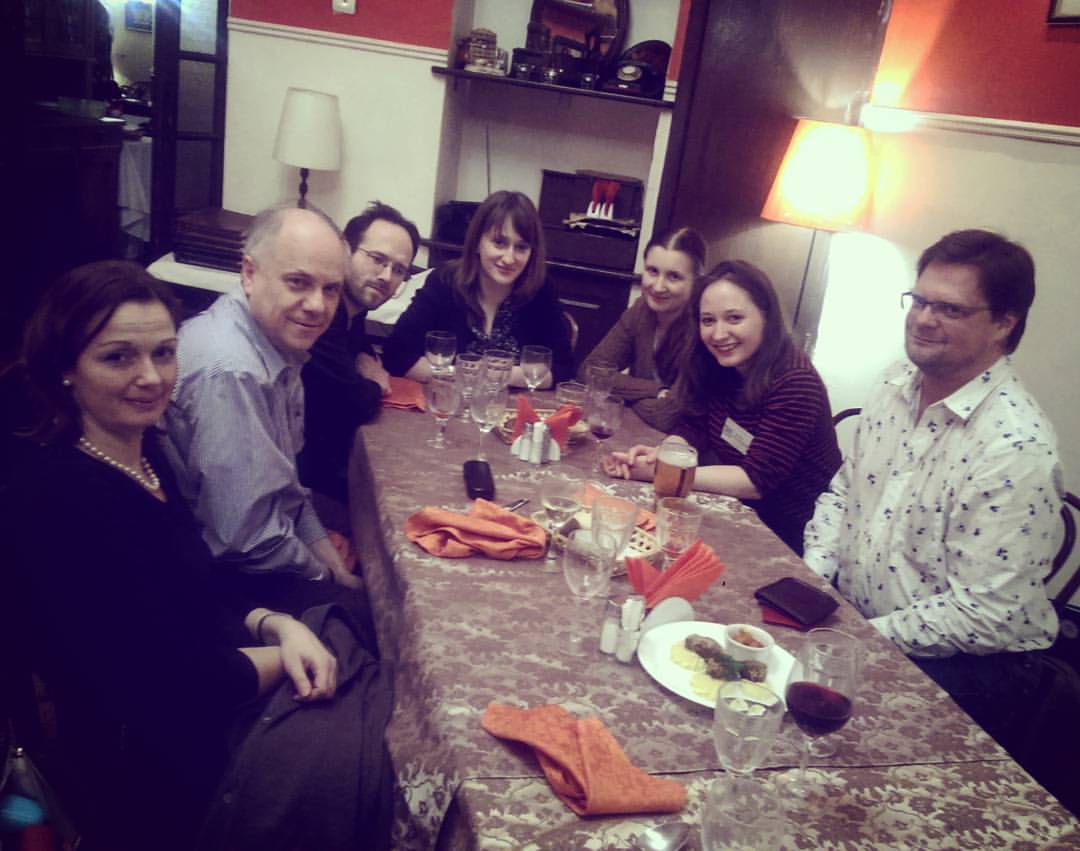
the conference dinner. From left to right: Katya Lyutikova, David Pesetsky, Misha Knyazev, Natasha Ivlieva, Maria Vassilyéva, Tatiana Bondarenko, Sergei Tatevosov
Last Wednesday, Thursday and Friday, the linguists of Moscow State University and Moscow State Pedagogical University hosted the second workshop on Formal Approaches to Russian Linguistics, with several MIT connections. The excellent conference was organized by frequent MIT visitor, former Fulbright Fellow and former visiting faculty Sergei Tatevosov and his colleague Ekaterina Lyutikova. David Pesetsky and alum Ora Matushansky (PhD 2002) were the invited speakers. David’s talk was entitled “Clause size and Nominal size: towards a derivational theory of both”. Ora, well-known for her work on semantics, syntax and morpology, spoke about … Russian phonology — specifically “A problem in the Hallean approach to the Russian verb”. In addition, alum Natasha Ivlieva (PhD 2013) of Moscow’s Higher School of Economics presented a talk on to li…to li disjunctions and Tatiana Bondarenko, a member of next Fall’s incoming class (!), spoke about “Russian applicatives and the lexical decomposition”. After FARL, David Pesetsky also presented a colloquium talk on his research concerning clause size at Moscow State University.

the conference dinner. From left to right: Katya Lyutikova, David Pesetsky, Misha Knyazev, Natasha Ivlieva, Maria Vassilyéva, Tatiana Bondarenko, Sergei Tatevosov
Jonathan Bobaljik: Fellow of the American Association for the Advancement of Science
Congratulations to distinguished alum Jonathan Bobaljik (PhD 1995), Professor of Linguistics at the University of Connecticut, on being elected a 2016 Fellow of the American Association for the Advancement of Science! The AAAS recognize individuals for their contributions to science and technology.
Congratulations to distinguished alum Jonathan Bobaljik (PhD 1995), Professor of Linguistics at the University of Connecticut, on being elected a 2016 Fellow of the American Association for the Advancement of Science! The AAAS recognize individuals for their contributions to science and technology.
Jonathan Bobaljik Wins Guggenheim Fellowship
Congratulations to our very distinguished 1995 PhD alum, Jonathan Bobaljik, of the University of Connecticuty, on winning a Guggenheim fellowship to study endangered languages.
Congratulations to our very distinguished 1995 PhD alum, Jonathan Bobaljik, of the University of Connecticuty, on winning a Guggenheim fellowship to study endangered languages.
Canada Research Chair for Jessica Coon
Great news — Jessica Coon (PhD 2010), Associate Professor of Linguistics at McGill, has been awarded a Canada Research Chair! Canada Research Chairs were created “to attract and retain some of the world’s most accomplished and promising minds. Chairholders aim to achieve research excellence in engineering and the natural sciences, health sciences, humanities, and social sciences.” Congratulations Jessica!!
P.S. In receiving this honor, Jessica joins another of our PhD alums at McGill, Michael Wagner (PhD 2005), another Canada Research Chair holder of whom we are proud.
Great news — Jessica Coon (PhD 2010), Associate Professor of Linguistics at McGill, has been awarded a Canada Research Chair! Canada Research Chairs were created “to attract and retain some of the world’s most accomplished and promising minds. Chairholders aim to achieve research excellence in engineering and the natural sciences, health sciences, humanities, and social sciences.” Congratulations Jessica!!
P.S. In receiving this honor, Jessica joins another of our PhD alums at McGill, Michael Wagner (PhD 2005), another Canada Research Chair holder of whom we are proud.
Bjorkman to Queen’s University
More exciting news! Bronwyn Bjorkman has accepted a tenure-track assistant professor position in morphosyntax at the Department of Languages, Literatures and Cultures at Queen’s University in Kingston, Ontario. Bronwyn completed her PhD in 2011, and has been a SSHRC postdoctoral fellow and a Banting Fellow (Canada’s “Nobel Prize of post-docs”) at the University of Toronto. Congratulations, Bronwyn!!
More exciting news! Bronwyn Bjorkman has accepted a tenure-track assistant professor position in morphosyntax at the Department of Languages, Literatures and Cultures at Queen’s University in Kingston, Ontario. Bronwyn completed her PhD in 2011, and has been a SSHRC postdoctoral fellow and a Banting Fellow (Canada’s “Nobel Prize of post-docs”) at the University of Toronto. Congratulations, Bronwyn!!
Promotion for Jessica Coon
Congratulations to Jessica Coon (PhD 2010) on her promotion to Associate Professor with Tenure at McGill University. Super-great wonderful news!!
Congratulations to Jessica Coon (PhD 2010) on her promotion to Associate Professor with Tenure at McGill University. Super-great wonderful news!!
Erlewine to National University of Singapore
We are absolutely delighted to announce that Michael Yoshitaka Erlewine has accepted a tenure-track assistant professor position in Linguistics at the National University of Singapore. Mitcho completed his PhD here in 2014 and has spent the past year as a post-doc at McGill. Congratulations mitcho!!!
We are absolutely delighted to announce that Michael Yoshitaka Erlewine has accepted a tenure-track assistant professor position in Linguistics at the National University of Singapore. Mitcho completed his PhD here in 2014 and has spent the past year as a post-doc at McGill. Congratulations mitcho!!!
PhDs hooded!
Three 2014 PhDs Michael Yoshitaka Erlewine, Yusuke Imanishi and Hadas Kotek joined newly minted 2015 PhD Wataru Uegaki for the traditional conferring of graduate hoods as part of MIT’s Commencement cermonies.
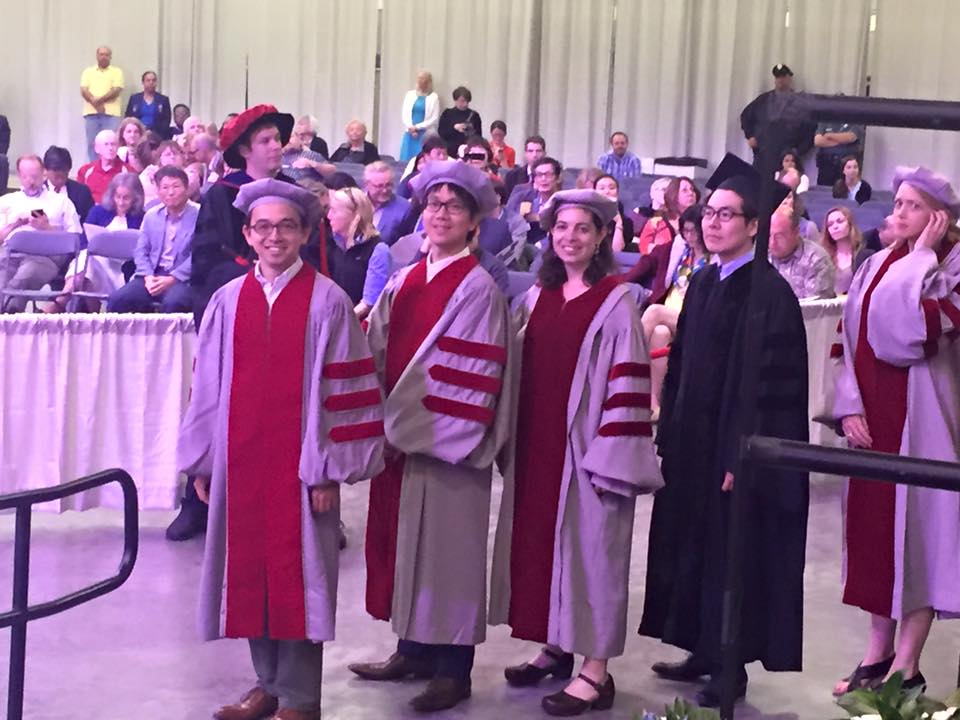
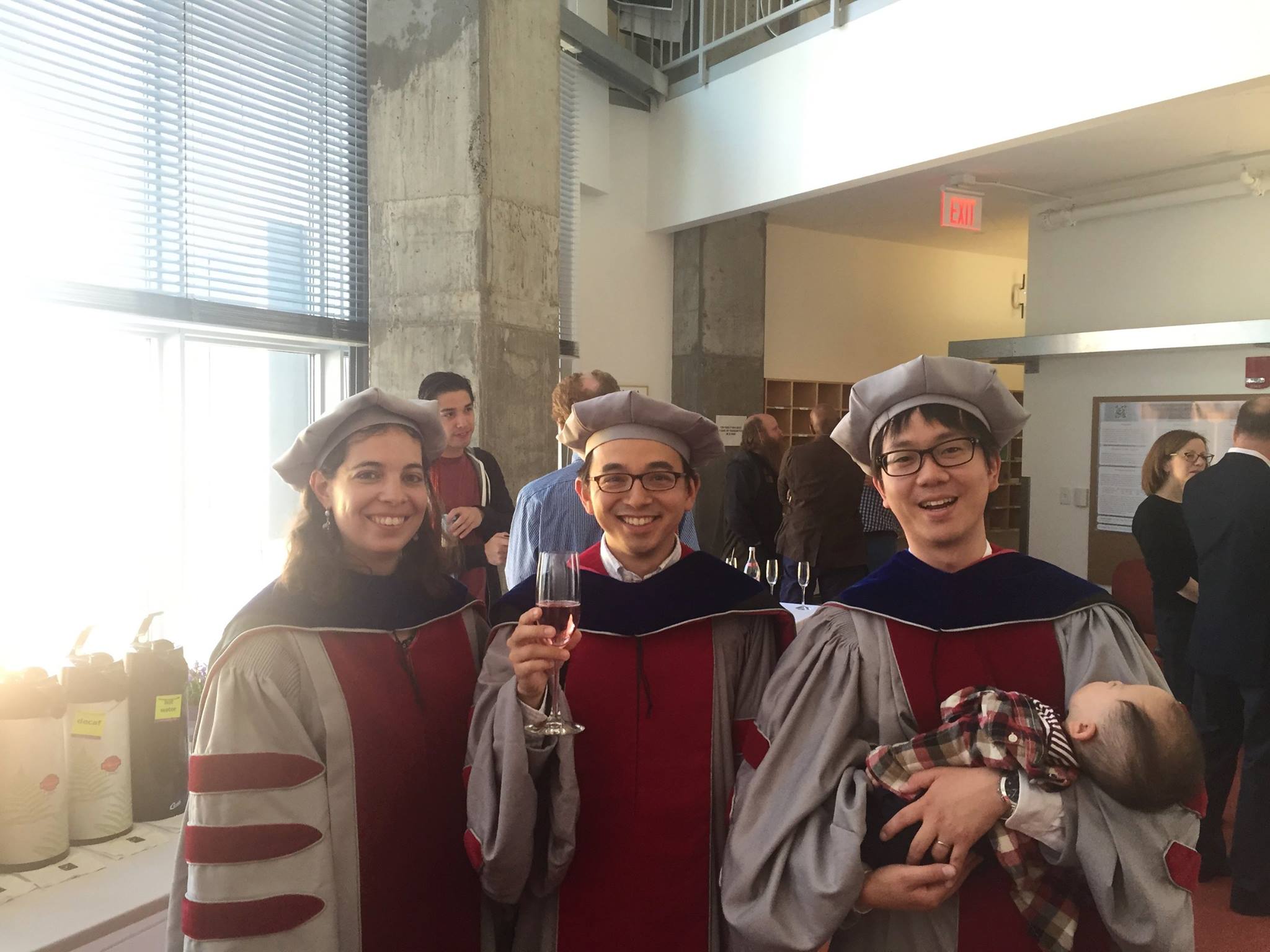
Three 2014 PhDs Michael Yoshitaka Erlewine, Yusuke Imanishi and Hadas Kotek joined newly minted 2015 PhD Wataru Uegaki for the traditional conferring of graduate hoods as part of MIT’s Commencement cermonies.


Tenure for Ezra Keshet
Exciting news from our alumnus Ezra Keshet (PhD 2008) who has been recommended for tenure and promotion to Associate Professor of Linguistics at the University of Michigan. Congratulations Ezra!!!
http://www.lsa.umich.edu/linguistics/people/faculty/ci.keshetezra_ci.detail
Exciting news from our alumnus Ezra Keshet (PhD 2008) who has been recommended for tenure and promotion to Associate Professor of Linguistics at the University of Michigan. Congratulations Ezra!!!
http://www.lsa.umich.edu/linguistics/people/faculty/ci.keshetezra_ci.detail
Tenure for Joey Sabbagh
We are celebrating the great news that our distinguished alum Joey Sabbagh (PhD 2005) has been officially recommended for promotion to Associate Professor with Tenure at the University of Texas Arlington. Joey wrote his dissertation on Non-verbal argument structure: evidence from Tagalog and is the author of numerous papers about Tagalog syntax. But he is also well-known for his ground-breaking work on the construction known as Right Node Raising, which was, as it happens, instantiated quite beautifully in the letter that he received yesterday with the great news:
“I am happy to inform you that [the University Tenure and Promotion Committee voted to approve __], and [President Karbhari will recommend to UT System __] [that you be granted tenure and promoted to associate professor].”
Congratulations!!
We are celebrating the great news that our distinguished alum Joey Sabbagh (PhD 2005) has been officially recommended for promotion to Associate Professor with Tenure at the University of Texas Arlington. Joey wrote his dissertation on Non-verbal argument structure: evidence from Tagalog and is the author of numerous papers about Tagalog syntax. But he is also well-known for his ground-breaking work on the construction known as Right Node Raising, which was, as it happens, instantiated quite beautifully in the letter that he received yesterday with the great news:
“I am happy to inform you that [the University Tenure and Promotion Committee voted to approve __], and [President Karbhari will recommend to UT System __] [that you be granted tenure and promoted to associate professor].”
Congratulations!!
Lieber co-author of LSA award-winning morphology reference
Con-grat-ul(?)-at-ion-s to our alum Rochelle Lieber (PhD 1980), and to her co-authors Laurie Bauer and Ingo Plag, whose book The Oxford Reference Guide to English Morphology has just been honored with the Leonard Bloomfield Book Award by the Linguistic Society of America! Shelly Lieber is Professor of Linguistics at the University of New Hampshire.
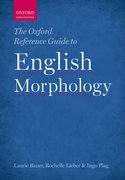
Con-grat-ul(?)-at-ion-s to our alum Rochelle Lieber (PhD 1980), and to her co-authors Laurie Bauer and Ingo Plag, whose book The Oxford Reference Guide to English Morphology has just been honored with the Leonard Bloomfield Book Award by the Linguistic Society of America! Shelly Lieber is Professor of Linguistics at the University of New Hampshire.

Halpert book to appear with Oxford University Press
Claire Halpert (PhD 2012, Assistant Professor at the University of Minnesota) has signed a contract with Oxford University Press to publish a monograph entitled Argument Licensing and Agreement: A Bantu Case Study in the series “Oxford Studies in Comparative Syntax” (edited by Richard Kayne). Congratulations, Claire!!
Claire Halpert (PhD 2012, Assistant Professor at the University of Minnesota) has signed a contract with Oxford University Press to publish a monograph entitled Argument Licensing and Agreement: A Bantu Case Study in the series “Oxford Studies in Comparative Syntax” (edited by Richard Kayne). Congratulations, Claire!!
Post-doctoral fellowship for Rafael Nonato
In July, Rafael Nonato (PhD 2013) will start a post-doctoral fellowship in the
Programa de Pós Graduação em Antropologia Social (Graduate Program in
Social Anthropology) of the Museu Nacional (National Museum) of UFRJ (Federal University of Rio de Janeiro), under the supervision of Prof.
Bruna Franchetto. His research project will develop an a new account of switch-reference systems and
related phenomena in the indigenous languages of the Americas. Congratulations, Rafael, on this exciting project!
In July, Rafael Nonato (PhD 2013) will start a post-doctoral fellowship in the Programa de Pós Graduação em Antropologia Social (Graduate Program in Social Anthropology) of the Museu Nacional (National Museum) of UFRJ (Federal University of Rio de Janeiro), under the supervision of Prof. Bruna Franchetto. His research project will develop an a new account of switch-reference systems and related phenomena in the indigenous languages of the Americas. Congratulations, Rafael, on this exciting project!
Sasha Podobryaev to Moscow HSE post-doc
Alexander Podobryaev (PhD 2014) has accepted a post-doctoral fellowship in the Faculty of Philology of the Higher School of Economics in Moscow, which (don’t be misled by the name!) boasts a new, exciting and growing linguistics program. Sasha is currently a visiting scientist at the Institute Jean Nicod in Paris. Congratulations, Sasha! Поздравляем Вас!!
Alexander Podobryaev (PhD 2014) has accepted a post-doctoral fellowship in the Faculty of Philology of the Higher School of Economics in Moscow, which (don’t be misled by the name!) boasts a new, exciting and growing linguistics program. Sasha is currently a visiting scientist at the Institute Jean Nicod in Paris. Congratulations, Sasha! Поздравляем Вас!!
Jonah Katz to West Virginia University
Heartiest congratulations to Jonah Katz (PhD 2010), who has accepted a tenure track position as Assistant Professor of Linguistics at West Virginia University! Jonah is currently a Mellon Postdoctoral Fellow and Visiting Assistant Professor at Berkeley (and was previously a CNRS Post-doctoral Fellow at the Ecole Normale Supérieure and Institut Jean Nicod in Paris). Great news!!
Heartiest congratulations to Jonah Katz (PhD 2010), who has accepted a tenure track position as Assistant Professor of Linguistics at West Virginia University! Jonah is currently a Mellon Postdoctoral Fellow and Visiting Assistant Professor at Berkeley (and was previously a CNRS Post-doctoral Fellow at the Ecole Normale Supérieure and Institut Jean Nicod in Paris). Great news!!
Omer Preminger to Maryland
Late breaking news - our most delighted congratulations to Omer Preminger (PhD 2011), who has just accepted a tenure-track position as Assistant Professor of Linguistics at the University of Maryland. After receiving his PhD, Omer was a post-doc in Masha Polinsky’s lab at Harvard, and is currently an Assistant Professor at Syracuse University. His monograph Agreement and its Failures will be published this summer by MIT Press. Congratulations, Omer!!
Late breaking news - our most delighted congratulations to Omer Preminger (PhD 2011), who has just accepted a tenure-track position as Assistant Professor of Linguistics at the University of Maryland. After receiving his PhD, Omer was a post-doc in Masha Polinsky’s lab at Harvard, and is currently an Assistant Professor at Syracuse University. His monograph Agreement and its Failures will be published this summer by MIT Press. Congratulations, Omer!!
AAAS congratulations for Wayne & Joseph
Congratulations to Joseph Aoun (MIT Linguistics PhD 1982, President of Northeastern University) and to Professor of Linguistics Emeritus Wayne O’Neil on their election as Fellows of the American Association for the Advancement of Science!
Congratulations to Joseph Aoun (MIT Linguistics PhD 1982, President of Northeastern University) and to Professor of Linguistics Emeritus Wayne O’Neil on their election as Fellows of the American Association for the Advancement of Science!
Bronwyn Bjorkman wins Banting Fellowship
Congratulations to Bronwyn Bjorkman (PhD 2011), who has just been officially named a Banting Postdoctoral Fellow, Canada’s most coveted postdoctoral award! As a Banting Fellow (who made it through stiff national and international competition), Bronwyn will conduct collaborative research with Elisabeth Cowper and other colleagues at the University of Toronto on a project entitled “Variation in temporal categorization: Towards a feature system for tense and aspect”. Great news!
Side note: Unless we have missed someone, we believe that Bronwyn is just the second linguist to win this fellowship since it was inaugurated three years ago. The other linguist so honored (two years ago) was Jessica Coon (PhD 2010), now an Assistant Professor at McGill.
Congratulations to Bronwyn Bjorkman (PhD 2011), who has just been officially named a Banting Postdoctoral Fellow, Canada’s most coveted postdoctoral award! As a Banting Fellow (who made it through stiff national and international competition), Bronwyn will conduct collaborative research with Elisabeth Cowper and other colleagues at the University of Toronto on a project entitled “Variation in temporal categorization: Towards a feature system for tense and aspect”. Great news!
Side note: Unless we have missed someone, we believe that Bronwyn is just the second linguist to win this fellowship since it was inaugurated three years ago. The other linguist so honored (two years ago) was Jessica Coon (PhD 2010), now an Assistant Professor at McGill.
Yasutada Sudo to University College London
We are delighted to announce that our very own Yasutada Sudo, who received his PhD from this department last summer (dissertation: On the Semantics of Phi Features on Pronouns), has accepted a position as Lecturer in Semantics at University College London (the British counterpart of a tenure-track Assistant Professorship.)
Yasu will be moving to London from Paris, where he has spent the past year as a post-doctoral fellow at the Institut Jean Nicod. Congratulations, Yasu!!
We are delighted to announce that our very own Yasutada Sudo, who received his PhD from this department last summer (dissertation: On the Semantics of Phi Features on Pronouns), has accepted a position as Lecturer in Semantics at University College London (the British counterpart of a tenure-track Assistant Professorship.)
Yasu will be moving to London from Paris, where he has spent the past year as a post-doctoral fellow at the Institut Jean Nicod. Congratulations, Yasu!!
Shosuke Haraguchi
Shigeru Miyagawa has written to us with some sad news:
“I’m saddened to inform you that Shosuke Haraguchi passed away on June 8th. According to a posting by a linguist in his group at Meikai University, the cause of the death was a stroke. He fell ill in his Meikai office and was taken to a hospital where he died. He was 68. Shosuke received his Ph.D. from MIT in 1975 and had been a pillar of the linguistics community in Japan.”
Haraguchi was a pioneer in the investigation of Japanese phonology from the perspective of autosegmental theory, and remained an active investigator of both phonology and syntax throughout his career, and a strong supporter of younger researchers in Japan.
Shigeru Miyagawa has written to us with some sad news:
“I’m saddened to inform you that Shosuke Haraguchi passed away on June 8th. According to a posting by a linguist in his group at Meikai University, the cause of the death was a stroke. He fell ill in his Meikai office and was taken to a hospital where he died. He was 68. Shosuke received his Ph.D. from MIT in 1975 and had been a pillar of the linguistics community in Japan.”
Haraguchi was a pioneer in the investigation of Japanese phonology from the perspective of autosegmental theory, and remained an active investigator of both phonology and syntax throughout his career, and a strong supporter of younger researchers in Japan.
Pesetsky, Bobaljik, Moltmann, Pancheva, Guha and cast of thousands at LISSIM 6
David Pesetsky is just back from teaching a two-week class on nominal case at the 6th Linguistics Summer School in the Indian Mountains (LISSIM 6) in Sidhbari, a town in the Kangra Valley in Himachal Pradesh (the state just north of Punjab, where the Himalayas begin). The faculty list was a real 1990s MIT Linguistics reunion, including Jonathan Bobaljik (PhD 1995) (who taught his new book on the cross-linguistic morphology of comparatives, superlatives and inchoatives), Friederike Moltmann (PhD 1992) (who taught about her own new work on tropes), and mid-1990s visitor (and frequent returnee) Roumyana Pancheva (who taught a class about her research on comparatives and the entire history of work on the topic). Among the twenty or so superb students in attendance was incoming first-year student Ishani Guha. David writes: “It was a fantastic summer school, with the most engaged students and dedicated organizers that I have ever seen (not to mention great colleagues)”. Click here for some photos!
David Pesetsky is just back from teaching a two-week class on nominal case at the 6th Linguistics Summer School in the Indian Mountains (LISSIM 6) in Sidhbari, a town in the Kangra Valley in Himachal Pradesh (the state just north of Punjab, where the Himalayas begin). The faculty list was a real 1990s MIT Linguistics reunion, including Jonathan Bobaljik (PhD 1995) (who taught his new book on the cross-linguistic morphology of comparatives, superlatives and inchoatives), Friederike Moltmann (PhD 1992) (who taught about her own new work on tropes), and mid-1990s visitor (and frequent returnee) Roumyana Pancheva (who taught a class about her research on comparatives and the entire history of work on the topic). Among the twenty or so superb students in attendance was incoming first-year student Ishani Guha. David writes: “It was a fantastic summer school, with the most engaged students and dedicated organizers that I have ever seen (not to mention great colleagues)”. Click here for some photos!
Abrusan and Magri top CNRS competitions in France
Recent alums Márta Abrusán (PhD 2007) and Giorgio Magri (PhD 2009) have both been successful in the most recent competitions for highly-prized positions at the CNRS in France. To see les résultats first-class pour Abrusán, cliquer here, and to see the même chose pour Magri, click ici. Félicitations, Márta et Giorgio!!
Recent alums Márta Abrusán (PhD 2007) and Giorgio Magri (PhD 2009) have both been successful in the most recent competitions for highly-prized positions at the CNRS in France. To see les résultats first-class pour Abrusán, cliquer here, and to see the même chose pour Magri, click ici. Félicitations, Márta et Giorgio!!
McAllister Byun to NYU
Tara McAllister Byun (PhD 2009) will be joining the Department of Communicative Sciences and Disorders at NYU this fall in a tenure-track position. Tara has been an assistant professor in the Department of Communication Sciences and Disorders at Montclair State University in New Jersey since 2009. Congratulations, Tara!
Tara McAllister Byun (PhD 2009) will be joining the Department of Communicative Sciences and Disorders at NYU this fall in a tenure-track position. Tara has been an assistant professor in the Department of Communication Sciences and Disorders at Montclair State University in New Jersey since 2009. Congratulations, Tara!
Preminger monograph to be published
Recent alum and visiting faculty member Omer Preminger has signed a contract with MIT Press to publish a monograph in the Linguistic Inquiry Monograph series, tentatively entitled Agreement and its Failures. Congratulations, Omer!!
Recent alum and visiting faculty member Omer Preminger has signed a contract with MIT Press to publish a monograph in the Linguistic Inquiry Monograph series, tentatively entitled Agreement and its Failures. Congratulations, Omer!!
Bjorkman to Toronto for post-doc!
Bronwyn Bjorkman, PhD 2011, has accepted a SSHRC post-doc at the University of Toronto, where she will work with Elizabeth Cowper. Congratulations, Bronwyn!!
Bronwyn Bjorkman, PhD 2011, has accepted a SSHRC post-doc at the University of Toronto, where she will work with Elizabeth Cowper. Congratulations, Bronwyn!!
Jonah Katz to Berkeley with a Mellon Fellowship
Phonetician and musicolinguist Jonah Katz (PhD 2010) has been awarded a 2-year Mellon Fellowship at UC Berkeley. Jonah has been a post-doc at the Institut Jean Nicod in Paris, and will move to Berkeley this summer. Paris, Berkeley, it’s a rough life …
Congratulations Jonah!!
Phonetician and musicolinguist Jonah Katz (PhD 2010) has been awarded a 2-year Mellon Fellowship at UC Berkeley. Jonah has been a post-doc at the Institut Jean Nicod in Paris, and will move to Berkeley this summer. Paris, Berkeley, it’s a rough life …
Congratulations Jonah!!
Preminger to Syracuse!
Omer Preminger, PhD 2011, has accepted a tenure-track Assistant Professor position at Syracuse University. Omer is spending the current academic year as a a Post-Doctoral Teaching Associate in our department, and as Post-Doctoral Research Fellow at the Polinsky Language Sciences Lab at Harvard. As we reported in 2010, Omer won the Levitan Teaching Award awarded by the School of Humanities, Arts and Social Sciences at MIT for “outstanding success in teaching undergraduate and graduate students” - so Syracuse linguistics is in for a treat.
Congratulations Omer!
Omer Preminger, PhD 2011, has accepted a tenure-track Assistant Professor position at Syracuse University. Omer is spending the current academic year as a a Post-Doctoral Teaching Associate in our department, and as Post-Doctoral Research Fellow at the Polinsky Language Sciences Lab at Harvard. As we reported in 2010, Omer won the Levitan Teaching Award awarded by the School of Humanities, Arts and Social Sciences at MIT for “outstanding success in teaching undergraduate and graduate students” - so Syracuse linguistics is in for a treat.
Congratulations Omer!
New research listing on our homepage
The MIT Linguistics homepage now has a link for a comprehensive (we’re getting there…) listing of papers and presentations by the members of our department over the past decade or so. (Click on the new Research tab.) Most of the papers currently included are by our graduate students, and links to faculty papers (and more links across the board) will be added in the coming months. All of our alumni are invited to inspect their listing and write in with corrections and additions.
The MIT Linguistics homepage now has a link for a comprehensive (we’re getting there…) listing of papers and presentations by the members of our department over the past decade or so. (Click on the new Research tab.) Most of the papers currently included are by our graduate students, and links to faculty papers (and more links across the board) will be added in the coming months. All of our alumni are invited to inspect their listing and write in with corrections and additions.
Katz paper accepted
Jonah Katz (PhD 2010), currently a post-doc at CNRS and the Institut Jean Nicod in Paris, writes to us that his paper “Compression effects in English” has been accepted for publication by the Journal of Phonetics. Congratulations, Jonah!
Jonah Katz (PhD 2010), currently a post-doc at CNRS and the Institut Jean Nicod in Paris, writes to us that his paper “Compression effects in English” has been accepted for publication by the Journal of Phonetics. Congratulations, Jonah!
Marie Curie fellowship for Giorgio Magri
Giorgio Magri (PhD 2009), who has been a post-doctoral researcher at the Institute Jean Nicod and the Ecole Normale Superieure in Paris, has won a very fancy Marie Curie Intra-European Fellowship, which will permit him to carry out further post-doctoral research on computational phonology with René Kager, at the Utrecht Institute of Linguistics (at the University of Utrecht in the Netherlands). Congratulations, Giorgio!
Giorgio Magri (PhD 2009), who has been a post-doctoral researcher at the Institute Jean Nicod and the Ecole Normale Superieure in Paris, has won a very fancy Marie Curie Intra-European Fellowship, which will permit him to carry out further post-doctoral research on computational phonology with René Kager, at the Utrecht Institute of Linguistics (at the University of Utrecht in the Netherlands). Congratulations, Giorgio!
Omer Preminger in NLLT
A new paper has just appeared in Natural Language and Linguistic Theory by Omer Preminger (PhD 2011, postdoctoral fellow with Masha Polinsky at Harvard and a visiting faculty member here). It is called “Asymmetries between person and number in syntax: a commentary on Baker’s SCOPA”. The abstract describes its contribution as follows: “In this commentary, I explore Basque data that counter-exemplifies SCOPA, as well as a handful of other empirical patterns that SCOPA fails to address, but which I believe should be treated as part of the same empirical landscape. But far from condemning SCOPA, I believe these additional patterns may provide us with hints regarding how SCOPA (with its considerable empirical coverage), as well as its exceptions, are to be derived.”
Congratulations, Omer!!
A new paper has just appeared in Natural Language and Linguistic Theory by Omer Preminger (PhD 2011, postdoctoral fellow with Masha Polinsky at Harvard and a visiting faculty member here). It is called “Asymmetries between person and number in syntax: a commentary on Baker’s SCOPA”. The abstract describes its contribution as follows: “In this commentary, I explore Basque data that counter-exemplifies SCOPA, as well as a handful of other empirical patterns that SCOPA fails to address, but which I believe should be treated as part of the same empirical landscape. But far from condemning SCOPA, I believe these additional patterns may provide us with hints regarding how SCOPA (with its considerable empirical coverage), as well as its exceptions, are to be derived.”
Congratulations, Omer!!
Joseph Aoun receives Muh Award
Joseph Aoun, 1982 Linguistics PhD, eminent syntactician, and President of Northeastern University, received the 2011 Robert A. Muh Alumni Award last Wednesday. The award (created by Robert Muh (SB ‘59) to honor the 50th anniversary of the the School of Humanities, Arts and Social Sciences) is presented every two years to an MIT alumnus who has made “made extraordinary contributions during a career in the arts, humanities, or social sciences”.
The award was presented by Deborah Fitzgerald, Dean of the School, who praised Aoun for his “outstanding contributions to the field of linguistics as well as educational leadership”. Introducing Joseph, David Pesetsky noted the ways in which his research had repeatedly uncovered “a deep unity between subsystems of grammar thought to be distinct”, and read a letter of congratulations from Noam Chomsky, who described the award as a “well-deserved honor for your remarkable contributions, not only to our own field but to the general intellectual and academic community”. David also noted that Joseph was an outstandingly distinguished member of an outstandingly distinguished PhD class that entered in 1978, three members of which (Prof. Carol Neidle of Boston University, James Huang of Harvard and our own Donca Steriade) were present in the hall. Joseph’s Muh Alumni Award Lecture, which followed the presentation of the award, had the rather non-linguistic title “The Future of American Higher Education in the Global Knowledge Marketplace” — but in fact began with a very personal intellectual autobiography that described some of the links between Joseph’s career in linguistics and his decision to enter university administration. It was interesting, engaging and at times moving event (video here). Congratulations Joseph Aoun!
(photographs by Richard Howard)
Joseph Aoun, 1982 Linguistics PhD, eminent syntactician, and President of Northeastern University, received the 2011 Robert A. Muh Alumni Award last Wednesday. The award (created by Robert Muh (SB ‘59) to honor the 50th anniversary of the the School of Humanities, Arts and Social Sciences) is presented every two years to an MIT alumnus who has made “made extraordinary contributions during a career in the arts, humanities, or social sciences”.
The award was presented by Deborah Fitzgerald, Dean of the School, who praised Aoun for his “outstanding contributions to the field of linguistics as well as educational leadership”. Introducing Joseph, David Pesetsky noted the ways in which his research had repeatedly uncovered “a deep unity between subsystems of grammar thought to be distinct”, and read a letter of congratulations from Noam Chomsky, who described the award as a “well-deserved honor for your remarkable contributions, not only to our own field but to the general intellectual and academic community”. David also noted that Joseph was an outstandingly distinguished member of an outstandingly distinguished PhD class that entered in 1978, three members of which (Prof. Carol Neidle of Boston University, James Huang of Harvard and our own Donca Steriade) were present in the hall. Joseph’s Muh Alumni Award Lecture, which followed the presentation of the award, had the rather non-linguistic title “The Future of American Higher Education in the Global Knowledge Marketplace” — but in fact began with a very personal intellectual autobiography that described some of the links between Joseph’s career in linguistics and his decision to enter university administration. It was interesting, engaging and at times moving event (video here). Congratulations Joseph Aoun!
Early Career Award from LSA for alum Seth Cable
We were ecstatic to learn that Seth Cable (PhD 2007) has won the 2012 Early Career Award of the Linguistic Society of America. This award (inaugurated in 2011) goes each year to “a new scholar who has made an outstanding contribution to the field of linguistics.” Seth’s dissertation, which was the source for his recent book The Grammar of Q (Oxford University Press) presents a theory of the syntax and semantics of wh-questions in which pied-piping effects arise without any actual notion of pied-piping in the grammar — a proposal about the structure of languages in general suggested by Seth’s own fieldwork on Tlingit, a Na-Dené language of Alaska. After MIT, Seth spent a post-doctoral year as a Killam Fellow at the University of British Columbia, and is now an Assistant Professor of Linguistics at UMass Amherst, where his current work explores many aspects of semantics and syntax in a wide variety of languages. Congratulations Seth!!
We were ecstatic to learn that Seth Cable (PhD 2007) has won the 2012 Early Career Award of the Linguistic Society of America. This award (inaugurated in 2011) goes each year to “a new scholar who has made an outstanding contribution to the field of linguistics.” Seth’s dissertation, which was the source for his recent book The Grammar of Q (Oxford University Press) presents a theory of the syntax and semantics of wh-questions in which pied-piping effects arise without any actual notion of pied-piping in the grammar — a proposal about the structure of languages in general suggested by Seth’s own fieldwork on Tlingit, a Na-Dené language of Alaska. After MIT, Seth spent a post-doctoral year as a Killam Fellow at the University of British Columbia, and is now an Assistant Professor of Linguistics at UMass Amherst, where his current work explores many aspects of semantics and syntax in a wide variety of languages. Congratulations Seth!!
Banting Fellowship for Jessica Coon
Jessica Coon (PhD 2010), who we earlier announced has accepted a tenure-track Assistant Professor position at McGill University, has also been awarded a Banting Post-Doctoral Fellowship, which will allow her to begin her career at McGill with two years devoted mainly to research. Described informally by a colleague as “the Nobel prize of post-docs”, the goal of the Banting fellowship program is “to attract and retain top-tier postdoctoral talent, both nationally and internationally, to develop their leadership potential and to position them for success as research leaders of tomorrow”. As a Banting Fellow, Jessica will be collaborating with McGill’s Lisa Travis (MIT PhD 1984) on an investigation of an array of surprising syntactic parallels between Mayan and Austronesian languages. Congratulations Jessica!
Jessica Coon (PhD 2010), who we earlier announced has accepted a tenure-track Assistant Professor position at McGill University, has also been awarded a Banting Post-Doctoral Fellowship, which will allow her to begin her career at McGill with two years devoted mainly to research. Described informally by a colleague as “the Nobel prize of post-docs”, the goal of the Banting fellowship program is “to attract and retain top-tier postdoctoral talent, both nationally and internationally, to develop their leadership potential and to position them for success as research leaders of tomorrow”. As a Banting Fellow, Jessica will be collaborating with McGill’s Lisa Travis (MIT PhD 1984) on an investigation of an array of surprising syntactic parallels between Mayan and Austronesian languages. Congratulations Jessica!
Maria Babyonyshev
We are deeply saddened by the news that our former student and colleague in linguistics Maria Babyonyshev has died at the untimely age of 44, from complications of a devastating 2006 car accident. Masha received not one, but two degrees from MIT. She received her undergraduate degree in linguistics from MIT in 1990 (Phi Beta Kappa) and her PhD from our department in 1996, with a dissertation entitled Structural Connections in Syntax and
Processing: Studies in Russian and Japanese. In fact, the word “connections” aptly describes Masha’s entire varied and influential research career, which steadfastly and continually charted and explored the links between linguistic theory, language acquisition and processing - as well as the links between the structure of her native language, Russian, and the other languages of the world. In her own papers and her many collaborations, Masha made some of the most interesting and cleverest connections we know between the theoretical and experimental sides of linguistics. Most recently, working with students and colleagues at Yale (where she was a member of the linguistics faculty) Masha had started investigating a striking pattern of language impairment widespread in one village in the Arkhangelsk region of Russia. As a researcher, as a member of our field, and as a friend, she will be badly missed.
Masha’s family writes us that they are “creating a fund to complete a project that Masha was pursuing over the last year out of her love of plants, flora and trees. The Antonovka Apple was her favorite apple growing up in Russia, but it is rarely used as an eating apple here and therefore is essentially not grown. She had recently imported seeds of the apple and was working on the plant science of growing seedlings. We wish to hire a plant scientist and nursery to complete the project and provide seedlings to our friends and family to plant where they would like. Masha’s living legacy will be the trees and apples. Please send contributions to: The Antonovka Fund, c/o Ted Walls and Nadia Babyonyshev, 67 Prospect Avenue, North Kingstown, RI 02852.”
We are deeply saddened by the news that our former student and colleague in linguistics Maria Babyonyshev has died at the untimely age of 44, from complications of a devastating 2006 car accident. Masha received not one, but two degrees from MIT. She received her undergraduate degree in linguistics from MIT in 1990 (Phi Beta Kappa) and her PhD from our department in 1996, with a dissertation entitled Structural Connections in Syntax and Processing: Studies in Russian and Japanese. In fact, the word “connections” aptly describes Masha’s entire varied and influential research career, which steadfastly and continually charted and explored the links between linguistic theory, language acquisition and processing - as well as the links between the structure of her native language, Russian, and the other languages of the world. In her own papers and her many collaborations, Masha made some of the most interesting and cleverest connections we know between the theoretical and experimental sides of linguistics. Most recently, working with students and colleagues at Yale (where she was a member of the linguistics faculty) Masha had started investigating a striking pattern of language impairment widespread in one village in the Arkhangelsk region of Russia. As a researcher, as a member of our field, and as a friend, she will be badly missed.
Masha’s family writes us that they are “creating a fund to complete a project that Masha was pursuing over the last year out of her love of plants, flora and trees. The Antonovka Apple was her favorite apple growing up in Russia, but it is rarely used as an eating apple here and therefore is essentially not grown. She had recently imported seeds of the apple and was working on the plant science of growing seedlings. We wish to hire a plant scientist and nursery to complete the project and provide seedlings to our friends and family to plant where they would like. Masha’s living legacy will be the trees and apples. Please send contributions to: The Antonovka Fund, c/o Ted Walls and Nadia Babyonyshev, 67 Prospect Avenue, North Kingstown, RI 02852.”
Jessie Little Doe Baird receives MacArthur genius grant
Jessie Little Doe Baird (SM, MIT Linguistics 2000), of the Wôpanâak Language Reclamation Project, has received a MacArthur “genius grant”. Background info on Baird appears in a 2008 article in the Technology Review. There is a nice video prepared by the MacArthur Foundation, a Boston Globe article, a couple of paragraphs in an MIT News item, which includes quotes from Norvin Richards, who continues Ken Hale’s work with the project: http://web.mit.edu/norvin/www/wopanaak.html. Here are Norvin’s remarks in full:
This award recognizes many years of enormously hard work in pursuit of a dream. It’s hard to imagine a better person to receive this grant! I joined the project in 1999 when I joined the faculty here; at that point, joining the project meant meeting regularly with Jessie and Ken in Ken’s office, poring over 17th-century Wôpanâak texts to try to understand what they could teach us about the grammar and vocabulary of the language. I am honored to still be part of the project today, working together with Jessie on a dictionary, a textbook, and a variety of other educational materials. Today, the project offers language classes at a variety of levels, staffed by Jessie and by her former language students, culminating in a summer Immersion Camp at which only Wôpanâak is spoken. Children are beginning to acquire the language as well, including Jessie’s own daughter Mae Alice Baird, raised by Jessie and her husband Jason entirely in Wôpanâak.
The world is currently in the middle of a massive wave of language extinction. Some linguists estimate that 90% of the world’s languages will vanish in the coming century. The indigenous languages of America are particularly hard hit. Against that backdrop, the success of the Wôpanâak Language Reclamation Project is a rare piece of good news. If Jessie succeeds, she will have shown that for languages, ‘death’ is not permanent; with enough dedication and hard work, as long as a language is sufficiently well documented, we can hope to bring it back to life.
Jessie Little Doe Baird (SM, MIT Linguistics 2000), of the Wôpanâak Language Reclamation Project, has received a MacArthur “genius grant”. Background info on Baird appears in a 2008 article in the Technology Review. There is a nice video prepared by the MacArthur Foundation, a Boston Globe article, a couple of paragraphs in an MIT News item, which includes quotes from Norvin Richards, who continues Ken Hale’s work with the project: http://web.mit.edu/norvin/www/wopanaak.html. Here are Norvin’s remarks in full:
This award recognizes many years of enormously hard work in pursuit of a dream. It’s hard to imagine a better person to receive this grant! I joined the project in 1999 when I joined the faculty here; at that point, joining the project meant meeting regularly with Jessie and Ken in Ken’s office, poring over 17th-century Wôpanâak texts to try to understand what they could teach us about the grammar and vocabulary of the language. I am honored to still be part of the project today, working together with Jessie on a dictionary, a textbook, and a variety of other educational materials. Today, the project offers language classes at a variety of levels, staffed by Jessie and by her former language students, culminating in a summer Immersion Camp at which only Wôpanâak is spoken. Children are beginning to acquire the language as well, including Jessie’s own daughter Mae Alice Baird, raised by Jessie and her husband Jason entirely in Wôpanâak.
The world is currently in the middle of a massive wave of language extinction. Some linguists estimate that 90% of the world’s languages will vanish in the coming century. The indigenous languages of America are particularly hard hit. Against that backdrop, the success of the Wôpanâak Language Reclamation Project is a rare piece of good news. If Jessie succeeds, she will have shown that for languages, ‘death’ is not permanent; with enough dedication and hard work, as long as a language is sufficiently well documented, we can hope to bring it back to life.
